#and you know there’s obviously the ongoing genocide of one of the groups of people (ukrainians) who he genocided in the past
Explore tagged Tumblr posts
Text
as a communist i feel a moral responsibility to celebrate stalin’s death day even louder than the liberals are gonna be doing it especially with the last year being what it was on the subject of fucking deranged irredentist ussr-nostalgic imperialist genocide apologia so 🍾 rest in piss fucko, god willing I will live to see the day communism frees itself from your rancid shadow
#over the past year I have seen the absolute moral collapse of so many leftists who I sed to sort of organize under#the berniecrat-to-hardcore-commie crowd#and I'm one of them right??? but somehow so many of these people turned into reactionary freaks#and so in honor of how much I hate them I'll pour one out for the biggest reactionary freak of all time#what am I pouring? piss. its piss. his legacy will be a gender neutral bathroom#also you know a little personal fuck you about that nazi collaboration <3 thanks for helping them kill my great grandparents#and you know there’s obviously the ongoing genocide of one of the groups of people (ukrainians) who he genocided in the past#so it really is vital to be hating him more than usual rn
17 notes
·
View notes
Note
I really hope it doesn't sound like I'm trying to start an argument with this, I genuinely want your opinion. Do you think Israel should exist? Do you think it can exist peacefully? I'm a Jewish kid, I support Palestine and think the genocide needs to stop, but I feel like some (obviously not all) of the criticism of Israel feels a little bit antisemitic. Like I've seen people saying that zionists control a bunch of things internationally and in the us government, and that sounds very similar to antisemitic conspiracy theories. I'm sorry for asking you this, I just don't know who to ask. My mom is really sensitive about this because she's been bullied for being Jewish. And my friends aren't quite as politically aware, so they don't understand the history and just keep being like "why did the us ever support Israel to begin with?" and they certainly don't understand where zionism came from so I can't have actual conversations with them
So if you have anything to say, or any resources, anything you think I should read, that would seriously be really helpful
This ask contains several complicated questions so I'll break it down and do my best to present not just my opinion but also what I understand to be the context and the alternatives, and what factors shape my thinking.
Do I believe the state of Israel should exist? On one level, I don't believe any states should exist. All modern nation-states are built on some amount of violence and ethnostates especially all require some amount of erasure of groups outside the national group being enshrined in the national mythology. This is not unique to Israel; Atatürk's "One nation one language one flag" policy continues to be the basis of Turkish aggression against and denial of Kurdish cultural existence for example. The ongoing Tigrayan genocide is part of the legacy of Amharic supremacy in the statecraft that went into the building of the state of Ethiopia. Every nation-state has a dark history casting a long shadow. For more context on this topic, Worshipping Power by Peter Gelderloos is a good read.
As far as alternatives, the proposals of Murray Bookchin, what he calls Social Ecology, and the Democratic Confederalism proposed by Abdullah Öcalan are promising. Other historical examples of alternatives past and present include the Haudeosaunee Confederacy, the Caracol model of the Zapatistas, peasant cooperative experiments seen in Makhnovchina during the Russian revolution and in revolutionary Spain in the 30s, and of course the Democratic Confederalist experiment in northeastern Syria aka Rojava.
The Rojava model is especially relevant because, while westerners tend to make armchair pronouncements about what ought to happen in the Middle East based on extremely flawed and limited knowledge and a deeply ingrained cultural bias (read Orientalism by Edward Said for more on that), there are experiments in pluralistic multicultural democracy that originate from within the region that are much more relevant. It's always so wild to me to hear Zionist apologia in the form of the question, "well what else could we ("we?") possibly support if not a two-state solution or an only-Israel 'the only democracy in the Middle East™️' solution?" When practically right next door there is a thriving 10-year experiment in radical democracy in an area with more ethnic, religious, and language groups than you can count on one hand, in an area where some people from those groups were brutally murdering each other less than a decade ago and now are having to find ways to patch up society and function in peace and with respect and self-determination for all groups there. That seems very relevant as an example but I almost never hear anyone mention it and Palestine together, despite historically the movements supporting each other.
As far as antisemitic conspiracy theories, I think you're right about that. I know a lot of people, even well-meaning people who have not fully examined their internalized antisemitism, will talk about US support for Israel as if Israel is controlling US politics and that is why there is so much military aid being sent, or they will talk about American support for Israel as if it's the result of Jewish influence in politics. On no other topic do Jews hold this amount of sway. Jews tend to support immigration reform and universal healthcare and yet we don't have the power as a tiny voting bloc to get those passed. No, the US supports Israel because it's an investment. Israel is essentially a weapons research and development laboratory for the US. The Israeli economy is overwhelmingly dependent on its military development and exports. A good source for this is the documentary film, "The Lab" directed by Yotam Feldman, an Israeli Jew himself, who goes into great detail on the role that Israel plays in weapons development for not only the US but also dictatorships in South America.
The other big source of American support for Israel is based on religion but not the Jewish religion. Evangelical Christians are by far the most powerful religious group in US politics, and they believe that Jews being returned to the holy land is a necessary component of triggering the war of Armageddon and bringing about end times etc. They are not our friends; our role in their teleology is to die to bring about the salvation of (a relatively small number of) Christians. This group is represented by powerful televangelists like John Hagee, whose organization Christians United For Israel describes itself as America's largest pro-Israel group. Not only are not all Jews Zionists and not all Zionists Jews; there are more Christian Zionists in America (30 million according to Tristan Sturm) than there are Jews in the entire world (less than 17 million according to Sheskin and Dashefsky data for 2023.)
Antisemitism absolutely still exists and is a real problem, and the conflation of critique of Israel with antisemitism makes genuine antisemitism much harder to address. Israeli propaganda deliberately inflames the reasonable and justified fears of Jewish people and directs them at a relatively powerless target rather than at the systems that endanger all of us.
I would argue that the state of Israel itself is antisemitic. Not only does it aggressively promote the old antisemitic narrative that conflates Jewish identity with Zionism, it has been instrumental in the displacement and destruction of so many Jewish communities and traditions that had been existing for centuries. I just finished reading My Father's Paradise, by a Kurdish Jew whose father's family was forced to relocate to Israel shortly after his bar mitzvah, the last ever to happen in the ancient Aramaic-speaking Jewish community of Zaxo in northern Iraq. It captures a poignant glimpse of how it feels to be the last surviving native speaker of your childhood language, and the role Israeli statecraft played in dooming many Jewish communities of the diaspora to that fate.
And here's maybe my hottest take: even if there were no genocide of Palestinians to worry about, I would still be anti-Zionist because I think Zionism is inherently anti-Jewish. Most of Jewish life has happened in the diaspora for the last several millennia, yet Zionism is an anti-diaspora ideology that sees our lives, our homes, our diverse sub-cultures and languages and spiritual practices as inferior, broken, not worth preserving let alone continuing. Modern Zionism is, by Hertzl's own admission, a settler-colonial project intended to shape Jewry into the mold popular among European nations at the time, and thereby win the respect of Christendom by playing their game on their terms and excelling. In short The national project of Israel is manufacturing whiteness for Jews.
But the truth is that for as long as there has been political Zionism, there have been Jewish anti-Zionists, as evidenced by folk songs like the century-old "Oy Ir Narishe Tsionisten" ("Oh You Foolish Zionists") re-popularized by Daniel Kahn, whose music is also associated with a Yiddish cultural revival among young diaspora Jews.
There's a lot more I could ramble on about and more books I could point towards but this is already very long and I'm no expert on the subject, just a very tired Jew who has been at this for a long time now. I'll leave you with a link to a good article about the recent wave of campus protests and incidents of alleged, and sometimes actual, antisemitism among them:
#antisemitism#jews#campus protests#jewish#antisemitism on campus#antizionism#you can also be anti zionist for reasons that are completely separate from palestine#palestine#google murray bookchin#support rojava#rojava#middle east#google abdullah öcalan
24 notes
·
View notes
Note
So obviously I don't expect you to speak for all Jewish people, but I don't know any in real life and was hoping for an opinion.
Is it in poor taste for goyim to borrow Yiddish terms in everyday conversation? Terms like mensch, schmuck, and schlep are so evocative and pleasant to use, but I always feel like I'm appropriating Jewish culture when I use them. On one hand I feel it's not my right to use them as an outsider, but on the other I feel that broader use creates more exposure and "normalizes" Jewish culture. Your post about people thinking that Jewish people literally have horns got me thinking about how ignorant people can be about cultures they haven't studied and how maybe a little extra exposure might do some good in the world.
Curious to hear what you think!
Thank you for consistently creating quality content and speaking out regarding the ongoing genocide in Palestine.
imo it depends on the context, and it's kind of part of a larger conversation. i don't think it's inherently appropriation for non jews to use yiddish words, many have become part of the general american lexicon (not sure abt other english speaking countries or other countries in general) to the point where a lot of people have no idea that some of the words they use are yiddish. especially in places like new york where there is a large jewish population, it's not a surprise that people who interact with jews on a regular basis have picked up some of the language, and honestly it's pretty cool.
that being said, i think the appropriation part comes in when people insist on separating those words from their yiddish origins, especially if their intent is distancing themselves from jews. they don't want to admit that they have picked up something that comes from jewish culture because they see it as a negative thing, so they insist it's become "de-judenized" in a sense. obviously it's not the exact same dynamic, but people do something similar when they call words that originated in the black community like "fam", "lit", "slay", "woke", etc "gen z slang" or "internet slang."
basically, if you spend a lot of time around a group of people, you're likely going to pick up some of the language they use. as long as you're aware of that and aren't weird about it, you're fine.
31 notes
·
View notes
Note
I know damn well that the invaders won't say what they ACTUALLY did when they report to the city. Like all colonialists, they choose to hide the atrocities that they've committed, and make themselves out to be the heroic and civilized people.
"We saved Mystique's kits and killed the barbarians!" Is what Sardine and co will say, praising themselves as those who bring lawfulness and justice to this barbaric society.
In reality, they're kidnapping children, raided the homes of the clans, desecrated their lands through urination and defection, murdered sick cats, children, and all the other innocent people they could get their claws on.
I'm hopeful that the exalted and chaff's opinions of the clans will change if they learn of what their leaders ACTUALLY do. Granted, the exalted benefit from the fascist society they live within, so it'll be a hard sell to those who are open to change. Since the chaff are the ones heavily suffering from the hierarchy that Razor and Sardine have upheld, and that they're being hurt by them, I believe that the chaff will be more open to education and change, at least in terms of their views on the clans.
Overall, fascism and colonialism is unsustainable, and Sardine's not at all safe, even though he isn't as openly fight-hungry as Razor.
Honestly, I don't see why they wouldn't brag about what they did in detail, at least to certain groups. There are obviously "normies" who they soften the atrocities for but in large part the city agrees with what they did and there's no shame in what they've done for them.
We're seeing this with Gaza right now. Israel's armed forces are gleefully posting tiktoks of the genocides. Israeli civilians take their lawn chairs to the beach to watch bombs drop on the opposite shore. There is a delight in the violence, in the murder of children, in the raided homes, in the destroyed medical supplies. At a certain point, fascists and colonizers don't need to hide anymore because they know they will be met with support.
I agree that the Chaff are more likely to be sympathetic to the Clans since marginalization makes it easier to open your eyes to the marginalized, but there are still poor conservatives. There are Black conservatives and gay conservatives.
But the good news is, you are right. Fascism is unsustainable. It will always lose. I just think it's important to point out that even the common man is not immune to supporting genocide, especially given the ongoing genocides in the real world right now.
8 notes
·
View notes
Note
my problem with the genocide charge is honestly multifaceted, (sorry I'm just having thoughts in your inbox) it's first of all; things can be bad, very bad, without being the worst anything has ever been.
and I don't know... if we're going by the kinda sorta academic definition of genocide that includes things like 'the ongoing genocide of african americans' or 'the ongoing canadian genocide of the first nations' and the sort of political situations where two groups can be attempting to genocide one another at the same time, then yes, I do think it's an accurate charge against medinat israel, probably. but it's still an antisemitic charge because it fails on the double standards clause. These western leftists aren't gathering this degree of outrage or demands of punative action for the US or Canada or the Scandinavian countries or literally all of europe, the countries they live in and whose governments (gd willing) they influence and vote for, despite being an equal charge, and as citizens they have an actual chance of influencing things for the better, as they do for the same claim levied against israel, by orders of magnitude.
and if we mean the legal definition, the popular understanding of genocide, then it is just wholly inaccurate - are palestinians oppressed? absolutely, is the occupation bad? absolutely, are civilians dying in war a terrible horrible no good very bad thing? yes of course, every life is priceless and irreplacable! but the pure numbers don't add up - the cide part of genocide matters for this definition, and a population whose growth isn't inhibited, and whose numbers (despite the civilian casulty toll) are nowhere near the losses of the rohingya or the armenians or the ukranians or the uyghurs or the tutsi or the jews... it's just not true. which should be an obviously antisemitic charge - a full lie about the bloodthirsty jews.
and I think a lot of the people out chanting wants the general population to think of definition two, but if you point out that the math aint mathing, they'll say that OBVIOUSLY they mean the first definition, so neener neener they aren't antisemitic. But as I said, I think definition one is still antisemitic, because reacting way harsher when the jewish state does something than when other countries do is antisemitic, EVEN IF what israel did is unambiguosly bad. but also. They want people to think definition two. to me it's a 'innocent to the murder, was busy robbing the bank' defence - claiming innocence on the blood libel by copping to the double standards.
And of course; things can be bad without being the worst.
sorry. that was a lot of words without any conclusion. I just. had thoughts.
feel free to have thoughts in my inbox (I promise nothing)
14 notes
·
View notes
Note
i agree with so much of what you say - reparations, holding actual accountability for war crimes committed now and in the past, etc. that we must demand a stop to the apartheid that has been upheld for years, and the violence used to uphold and expand it. I'm not sure I 100% agree that the only peaceful solution is 1-state, but I am for sure open to the concept. The one thing I will say is that its not projecting when Israelis see calls for all Israelis to be eradicated. It's obviously not the majority calling for this, so I think its essential to make sure that the messages you stand behind are spread, but I think its disingenuous to be like "oh y'all are just freaked out for nothing, its not like anyone is calling for your full extermination" when there are groups that are not only calling for it, but attempting to action it. Its obviously not an equivalent situation in ANY way but any time you're demanding someone give up power over another person/group, that they are almost never going to comply when they see a credible threat that you are pretending doesn't exist. Even if you think that they deserve consequences for their actions, or if you think the threat they are seeing is nothing compared to the harm they've done.
once again... the people calling for the genocide of Jewish people or attempting to action it are NOT Palestinians, therefore the ASSUMPTION of what Palestinians MIGHT do once they are free from years of subjugation and occupation IS projection, and baseless. it IS projection when there are literally videos of Israelis saying "death to Arabs", of the endless violence Israel has enacted on Palestinians for years.
i know we agree on most of it like you said, but my issue is that people are responding to a proposed solution (which has not been genuinely, materially attempted with Palestinian emancipation and autonomy in mind) to solve a real, horrific event happening on the ground right now (the ongoing genocide of Palestinians by Israel) with a HYPOTHETICAL SITUATION which HAS NOT HAPPENED YET AND THERE HAS NOT BEEN AN ATTEMPT OF (Palestinians ethnically cleansing or committing genocide against Israelis)
3 notes
·
View notes
Note
TL;DR: I don't think it's an issue to give AO3 $10 if you're already donating money to other more time-sensitive causes like Gaza
This is a very interesting question, I think. If we're looking at it in an extremely general sense, it's a question of whether to put your funds towards a "long-term" solution or a "short-term" solution.
How is AO3 even remotely a long-term solution?
In the barest sense, I believe that the only viable long-term solution to the these kinds of conflicts is that the people in power are able to see the people not in power as humans. Education and exposure to new ideas are how you "deprogram" the kind of fanatacism that leads to genocide.
AO3 is a very odd choice for this, but it's a no-barrier way for folks across the world to exchange ideas and read stories. It promotes literacy, even if that's not the main "goal." Even if you're only reading smut or "low art" or whatever, I think it's a lot harder to shoot someone if you're waiting for them to update a chapter in your favorite fic. Obviously not everyone comes to this sort of realization: it is hard to think about how the "enemy of your nation" might be reading and writing the same kinds of things you read and write, but the truth of the internet is that just about everyone in the world is connected to it.
AO3 is likely not the most efficient avenue towards solving this specific conflict, and is easier to point at as a potential solution/education mechanism for LGBT issues in the world, but I don't want to get too into that side of things.
How does that help anyone right now?
It doesn't really, and personally I disagree with a lot of "longtermism" and the "ethical altruism" movement in particular. I think it's either equally or more important to address current issues: starvation and genocide. If you had to put it in monetary form, I think if you donated a few hundred dollars towards helping out people struggling right now in Gaza, you shouldn't feel bad about spending $10 towards AO3, your local library, or another more "long term" type of non-profit aimed at education or literacy.
I think it can be very easy to get caught up in different "teams" or "group think", which is why the deactivated user before me responded so violently to this question. The genocide in Gaza is extremely serious, and it really does seem like nobody in power gives a shit, so it can be difficult to see people throwing money at things which seem to have higher visibility.
OTOH, I haven't seen any posts telling people off- at least not with this kind of language- for not donating to help folks in Sudan, so I don't know if you can really say that the Israel-Gaza conflict is low-visibility. I doubt I would know anything about ongoing human rights abuses in Nicaragua if I didn't know people who had family there. That is part of why some folks feel more comfortable donating to larger nonprofits rather than directly to individuals, since it is hard for one person to determine who needs money the most. And the larger the organization is, the less money goes directly towards need, even in the slimmest operations just due to admin costs.
Should I donate to AO3?
#probably missing some stuff since im at work and cant really research atm#please unfollow me if you dislike nuance#thanks
2K notes
·
View notes
Note
you've been posting about performative activism and social media, so what do u mean exactly? isn't social media meant to be used to help spread the word on issues and important information? isn't making even a small change in the RPC by banning problematic FCs and plots?
pretty sure i said this before but i'll say it again: spreading awareness is NOT the same as activism. and i agree, social media is a great way to spread information quickly to the masses but it's also a double-edged sword in that it also allows for propaganda and misinformation to go viral that can harm important causes.
my commentary has been about what i've been seeing on my dash the last few days about i/p. i've seen some users auto-reblog #free palestine posts with sources from tiktok, twitter, instagram, and other random tumblr users that are just sharing personal feelings on the topic minute by minute by minute as if they're not really reading what they're sharing. those are the ones i'm commenting on because i frankly don't feel they're doing anything to further any change and it kind of distracts from the important information needing to be shared. for the record, my commentary is NOT referring to the ones who are only posting information about where and when strikes are happening, what companies and brands to boycott, and donation links. THOSE are all HELPFUL posts to share and i am all for it.
and on top of that, i've yet to see how banning anything in the tumblr rpc has changed anything socially. banning things for the comfort and safety of a group's mindset isn't activism in my opinion ––��it's just basic human decency. don't get me wrong, i believe in writing what you want it's fiction and impossible to believe a public space can cater to everyone's perfect ideals, but i also believe in just... common sense?? idk (this is one very specific example i personally experienced) maybe let's not use a virus breaking out as a plot device in an rp when covid is still fresh and ongoing in the world. there are people who've lost loved ones or may still be suffering from longterm side effects. obviously i think we can apply that scenario to pretty much any major world event like war and genocide and school shootings and other things that are truly traumatizing and i'm sure none of us would like to encounter writing in fiction. sure, if banning a plot or fc makes even one person in a group environment more comfortable for whatever reason i'm all for it. but again, it's not really activism because it's not changing anything outside of tumblr.
also from what i've seen as an outsider observer, i've yet to see any positive reinforcement for those who listen to voices speaking up on groups who didn't know something they were doing was problematic to begin with. even after apologizing and amending it, public shaming on all their mistakes under the guise of "holding people accountable" continued. that's not activism, that's just bullying.
1 note
·
View note
Text
This take is incredibly white, and very disrespectful and ignorant to the struggles that black and brown indigenous people are facing right now and have been facing for years. I cannot believe that you have the audacity to talk down to black and brown indigenous people that are calling out companies that quite literally built themselves off of our genocide and exploitation companies like Nestlé, the steel water from the local people while they have contaminated on drinkable water companies that rely on the exploitation of indigenous peoples are labor and the land and its resources. you’re seriously going to put down people who rightfully call out companies like Nestlé that have been known to use the labor of indigenous, black and brown children to make their products. This post lacks all Intersectionality and I really hope it was not written by a black or brown person, because if it was, that is so incredibly shameful you need to learn your own history. You need to immerse yourself in indigenous communities, and understand the things that we are facing right now because this post is not it. if you want to support and put your money towards rainbow, colonialism by all means go ahead but don’t you dare talk down to the indigenous people that are actively suffering because of it don’t demean us and when we called this bullshit out we have every right to talk about the exploitation that is harming our people. Did you ever stop to think about the Indigenous black and brown people that are growing the materials, putting their labor towards creating these objects that are going to be sold to gullible or careless, mostly white clears? Did you stop to think about the Asian women that are making your clothes that have rainbows and quirky comments about lesbians on them? Are you so selfish that you would attack black and brown people for calling out systems of oppression and go as low as to blame us and accuse us of eating our oppressors just because we call out rainbow colonialism? You are definitely not an ally to our communities. You definitely don’t know shit about indigenous people and you obviously don’t care about us. We are literally facing an ongoing genocide for the last 400 years and you’re bitching at us because we are rightfully calling out a companies that don’t give a fuck about you that are exploiting, black and brown labor to create their products that they sell in mass market for one month of the year, oh well funding companies that actively harm not only indigenous people but also the white queers you love so much? Genuinely you are a piece of shit and anyone with this line of thinking it’s trash. You live on our stolen land without our permission and you think you have the right to speak to us like this? if you support massmarketed pride merch at the expense of black browAll the re-blogs on this post are nothing but a circle jerk of white queers agreeing with each other, and actively disrespecting and silencing, black and brown voices. Y’all are a joke you are not serious about any kind of liberation whatsoever. You just wanna sit around agreeing with each other acting like you’re oppressed when in fact, you’re the most privileged group in America. When it comes down to it, you don’t give a fuck about black and brown lives you are ready to sacrifice us in an instant because you want your fucking pride merch so bad it’s insane that you know that these corporations are exploiting you financially benefiting while actively impressing you, and you don’t care about how it affects indigenous people. The people who stolen lands are illegally occupying the people who make the clothes on your back? It’s fucking shameful. And it’s exactly why people like me. Take a heart stance and simply don’t want anything to do with you whatsoever. My community is black, brown indigenous people I am not in community with white queer people and this is exactly why I don’t celebrate pride month because there is nothing to celebrate without the liberation of black brown indigenous people get fucking serious or get the fuck out of the way.

0 notes
Note
hey did u see that article where labor said they want to consider aus becoming a republic if they get re-elected next term? thought it was pretty interesting and defs good timing— let's be honest the queen isn't gonna live much longer so they probs want to take advantage of that and the transition happen that way. do u have any thoughts?
this feels like such a strange question to receive, so, honestly? spicy take? i think it's pretty much irrelevant to anything material or real about australian politics. rant incoming!
like yeah sure, it's archaic to have the british monarchy as our head of state, but it has no real on the ground effect, and becoming a republic or not is basically just symbolic. "oh but the queen could dissolve parliament and replace the PM if she want--" yeah, and becoming a republic won't stop the UK and/or the USA from changing the direction of aus politics either overtly or covertly. if our superpower patrons don't like what our government decides to do, it'd be far more easier for the CIA to quietly remove the PM than get king charles to do it... they've done it before, ~~allegedly~~~, and imho, i don't think it's too crazy to think there were foreign government hands in play at the removals of rudd and turnbull, not just newscorp... sure it sounds tinfoil hat. but like. when has the USA (and to a lesser degree the UK) not meddled in international politics to sure up their own positions? we're their western country in the pacific, being a republic won't change that; gotta have a staging ground for the upcoming war.
i think a far more radical stance that should be put on the table is admitting that australia, as a nation (in the wesphalian sense), is the ongoing perpetuation of 200+ years of colonisation born from genocide, and every australian government and PM had directly inherited its power from that bloodshed.... and then asking how we, not as a "nation", but as a group of people living on a shared land, want to go forward with that, and what we might actually want a fresh system of governance to look like.
it's obfuscated by the changing of party hands and pretending like each new government is a new entity instead of just the ruling classes changing the team colours and top guy; but however you slice it, each PM has been handed power by the previous one, who was handed it by the previous one, right back through the white australia policy and boundary streets and "fauna" and terra nullius.
obviously not a position any extant aussie government is going to put forward, admitting that the concept of "the australian government" is a direct lineage of violent occupation.... much easier to pretend whether or not we should be a republic is an actual meaningful question that might affect the lives of people that live on this land, traditional owners and immigrants/colonists alike.
it's why john howard let us have a referendum on it, ask the people "should the queen be in charge, or an australian president?", frame it as a bold question at the very brink of what's possible, so that questions like "should we continue to let colonist power be in charge, or maybe rectify mistakes of the past instead?" seem far beyond the brink of what can be imagined.
albanese must know the incredible civil unrest and polarised divisiveness and revolutionary zeal (both left and right) that is bubbling up in the country.... best to give the plebs a release valve, the illusion of control, the facade of democracy. "we'll let the people decide the future of the country", while structurally changing nothing that could threaten the system that brought him power.
labor is a centrist party, and we shouldn't confuse our relief at throwing the far right coalition in the bin for hope that labor will bring meaningful change. they can't do anything meaningfully different, or they wouldn't be allowed to run the country; and whether or not the monarchy is officially in charge doesn't matter to the men (both within our borders and within foreign governments) that make the real decisions about what a government is and isn't allowed to do.
that said, the brits should definitely overthrow the monarchy and reclaim all their land and assets for the people, that'd probably be real neat for them; and i feel like just the phrase "king charles" is incentive enough for many.
25 notes
·
View notes
Note
Hey Lightning, I was wondering if I could get your thoughts on something. One take that seems to keep returning every once in a while is the "Allura fell for Lotor only after he revealed his Altean heritage," but I know u and others have disproven this many times, which does reassure me. While I love Allura, I definitely think one of her weaknesses was her devotion to Altea and singing Alfor's praises, which sometimes became too much. At the same time, it bothers me when I see some ppl (1/?)
Continuing anon message: “ say that she thought Alteans were superior to all other races, and that when the colony plot twist happened, she became repulsed by Lotor's Galra side, which is why she rejected him. For them, that's why she forced violent memories onto an uncorrupted Zarkon, but somehow "saw the good/redeemed" Honerva, the Altean. I can kind of understand where they're coming from, but for me, it just didn't make sense that Allura suddenly had a change of heart considering for most of s8, she was angry and dead set on going after Honerva. Even with that, I think to a lot of her fans, s8 made Allura so ooc that she became unrecognizable, which hurt to watch. I guess for me it's hard seeing antis and people who don't like her claim that that's just how she is and has always been. Haha sorry for rambling, but I'd love to hear your thoughts on this, since your arguments ease my mind on a lot of things when it comes to Allura :)”
Hi, anon. Wow, thanks for your extended note! I don’t know anywhere in canon that Allura champions Alteans as a superior race. The definition of racial supremacy is a belief that inherent genetic differences between races determine cultural or individual achievement, with social/governmental policies championing intolerance of other races. To get Allura to fit into such a label:
1. A viewer has to ignore or undermine all the evidence available about who the main-universe Alteans really were before main-universe Zarkon’s massacre of them.
2. A viewer has to ignore or undermine how Allura actually responds to a variety of different races in the show, including her own.
So let’s start with issue one. To support an “Allura was a racial supremacist” opinion, a lot of antis (and even non-militant, average viewers) are favorable to the opinion that Alteans as a group, including Alfor, were actually evil and violent colonizer elitists before Galrans killed them off. In other words, they question Altean victimhood, and this allows the militant antis to poison and undermine scenes of a woman mourning her home and her beloved family. And it just gets to be a really unsettling conversation, to listen to someone actually try to justify genocide. They’ll also have suspicions that all of our foundational backstory in the s3 finale was just “cleansed” propaganda from Coran. So if antis can undermine Allura’s entire race and family as corrupt, then they can intentionally undermine any of her canonical statements about or efforts toward peace. Which is hilarious, because this racist tactic applied to Allura is actually what a lot of antis accuse Allura of doing with Lotor.
For the record, I don’t think the show production team actually intended the subliminal messaging/cognitive dissonance that I’m about to discuss. The people who designed and developed this show are fans of robot kitties and aren’t PhDs in social issues. But I think there is a very serious issue about the portrayal of genocide victims that feeds into some very real problems in our world, especially regarding the concept of racial supremacy and conspiracy theories about genocide victims.
VLD tried to play with both genocide politics for edge™ points while ALSO playing with shatterglass theory (shatterglass meaning an AU where the heroes are villains and villains are heroes). Combining these two concepts into the same universe creates some incredibly disturbing subliminal messaging about Alteans that very closely mimics ongoing neo-Nazi propaganda against Jews. Nazis and other anti-Semitists justify their hatred of Jews by equating them as terrible villains out for world domination via some underhanded shadow control of the mass populace. It’s an incredibly malicious form of propaganda, because it works so terribly well. And what do you know, VLD plays right into this kind of propaganda. In the season 3 episode, Hole in the Sky, we’re faced with team Voltron confronting an Altean Empire that was actually evil and out for multiverse domination. And oh by the way, they’re using malicious shadow tech to control a mass populace.
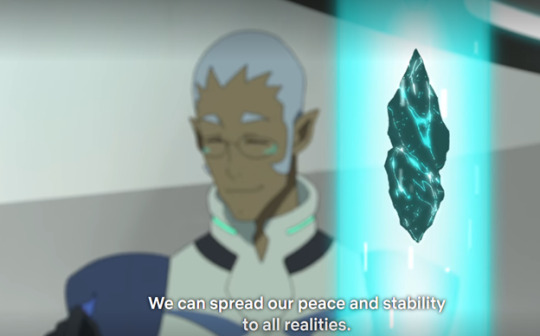
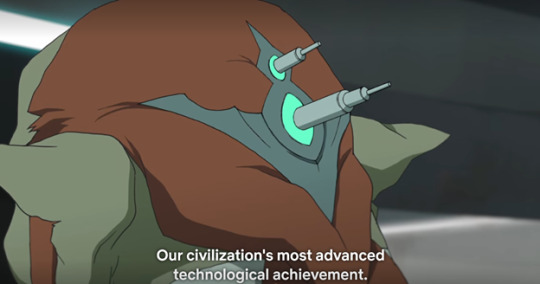

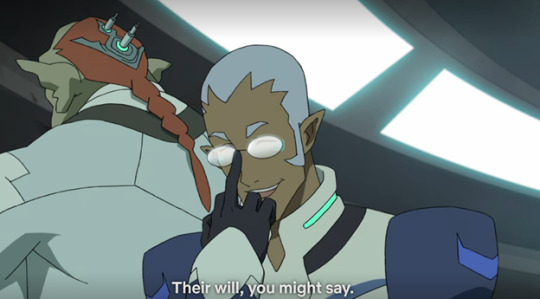
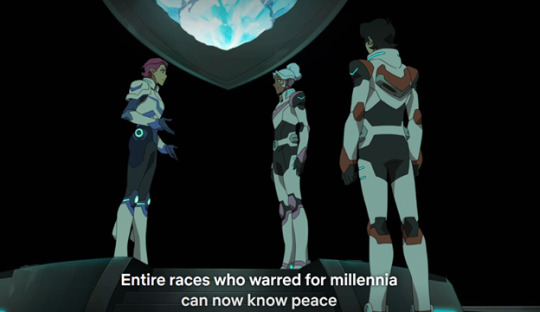


It’s like someone on the production team read the Protocols of the Elders of Zion and then just copied/pasted that incredibly damaging and widely accepted conspiracy theory right onto Alteans for s3 funsies because edge content.
This is incredibly punishing, for the narrative to wave the carrot stick in front of genocide survivors that maybe some others survived—and then to suggest that Alteans were the evil ones all along. A shatterglass twist worked very well in Captain Marvel (2019) for a lot of reasons, for example, but it just doesn’t work well in the VLD universe given that the show explicitly portrays the genocide victims as evil and validates this concept. And this episode unfortunately feeds ongoing cognitive dissonance in antis that if AU Alteans could be so evil…how certain are you that they aren’t in the main universe too? On the reverse side, the main-universe goes out of its way to portray that not all Galrans are evil, and even that Galrans were the primary resistance (BOM). But in this singular episode, we see a united Altean empire. And the only Altean who moves to stand against it once the shine wears off…is Allura. There is no AU Altean actually shown in the Guns of Gamara. So Allura stands alone as an Altean against her own people.
For this reason, this episode doesn’t function very well as a shatterglass AU either, because the moral “flip” isn’t a mirror balance to main universe. The Alteans of the AU world appear as fully united in their evil plans. And then, no doubt, anti-alluras point out other quirky things about main-universe Alteans throughout the show—the violent language-learning system that scares Pidge, and the ancient Altean terraforming technology that Haggar activates, and the fact that Oriande is a hidden place that keeps out the less magical with a violent guardian. These details, when removed from main-universe world building, create a cognitive dissonance about whether main-universe Allura and Alteans were actually genuine in how they depicted respectful “peace and diplomacy.” So anti alluras who believe Allura was a racial supremacist really rely on this s3 episode and these details to uphold their conspiracy theory.
So let’s focus on Allura in this episode, because it says a lot about who she ultimately is as a person, and people have forgotten how she actually responded in this episode. Allura is unquestionably hopeful at the thought that her and Coran might not be the last Alteans alive. Pretty understandable. If I were the last human, I’d be darn excited to find out there’s more of me left, lol. So her experience as a genocide victim initially blinds her to the evilness of these Alteans. You can even see the ache on her face, of how badly she wants to believe their narrative of peace.

So Allura is initially star-struck that she and Coran are not the last Alteans, yes, and that somehow they’ve achieved a “peace.” She is also not afraid to admit that they would be valuable allies in the war:

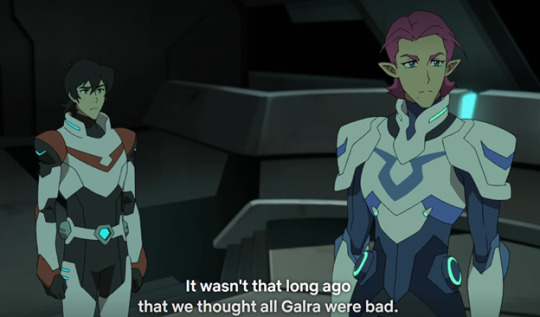
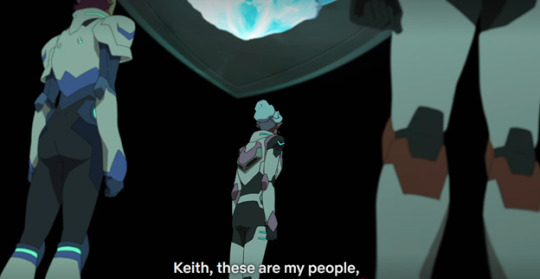
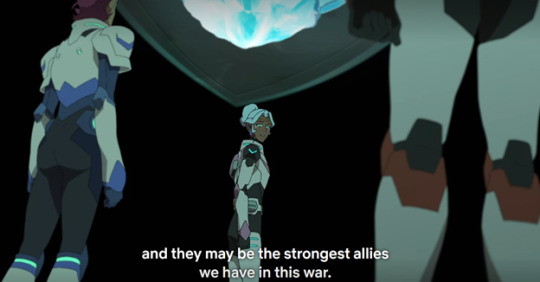
And she’s not wrong there, considering that they have what appears to be extensive military resources and a robot force of their own. But she makes a critical mistake in assuming that “these are my people” means that they share main-universe cultural sentiments. The instant Allura hears Slav (so not someone of her own race) call these Alteans out as actually evil colonizers turning people into slaves, she begins to question the narrative she’s received.
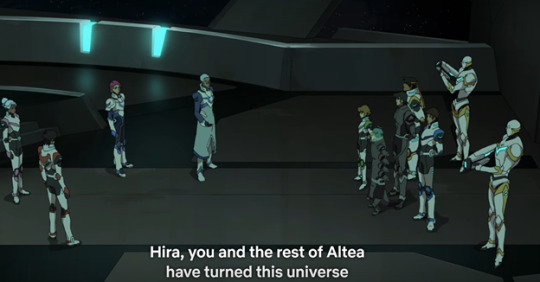
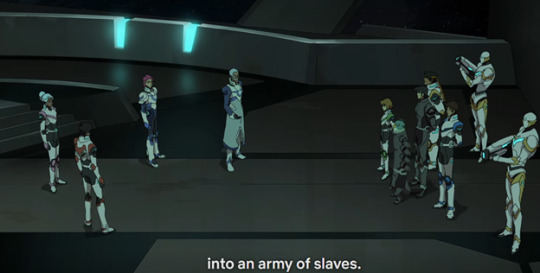


In this instance, she actually affords the Alteans the same courtesy she afforded Lotor—the opportunity to deny the accusations.

But in the AU Altean’s case, they try to turn blame back on other parties. Allura listens to Keith when he grows increasingly fearful of what the Alteans might do to the others, and she tries to plead for actual peace:
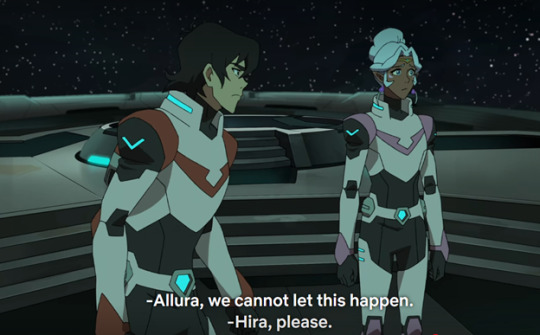



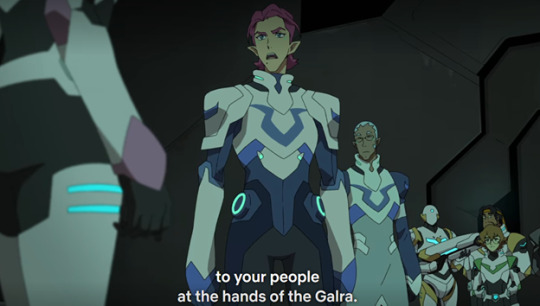
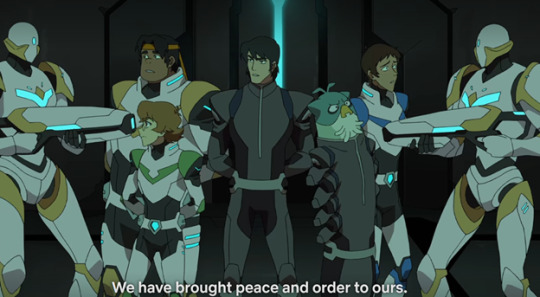
And actually, this is a pretty interesting moment for Allura. She tries to salvage an alliance…until she realizes that their differences are irreconcilable, and that their definition of peace is inherently different from her own. This probably sets the stage for why Allura was so triggered by Lotor talking about peace while also killing people—because she’s seen people misappropriate that term before. And also probably informs why she trusts the information of both Keith and Krolia (both of whom have Galran blood, btw).
Ultimately, Allura turns against her own people. Violently:

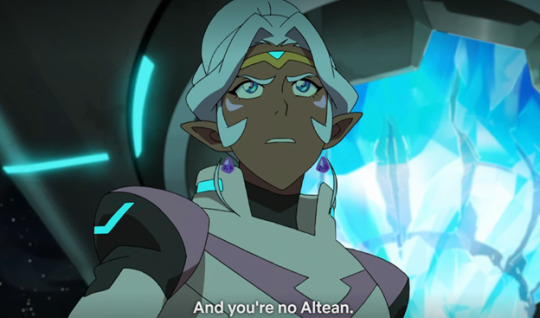

When they get angry about her wanting actual peace, Allura draws a weapon against them and rejects them from her people. This mimics how she spends several seasons fighting an Altean Haggar/Honerva for her crimes, and how she turns against Lotor too.
So case in point here, Allura loves her people, obviously—but she also is holding them to moral standards regarding their behavior, which is something that a genuine racist doesn’t do. As a matter of fact, Lotor is the only person of Altean blood that Allura genuinely bonds with ever again in the series. She’s distant with Romelle, she’s distant with the s8 Alteans… In s8, Allura even says this about Luca, which refers back to her own mistakes she made with initially being star-struck by the s3 AU Alteans who came in “peace”:
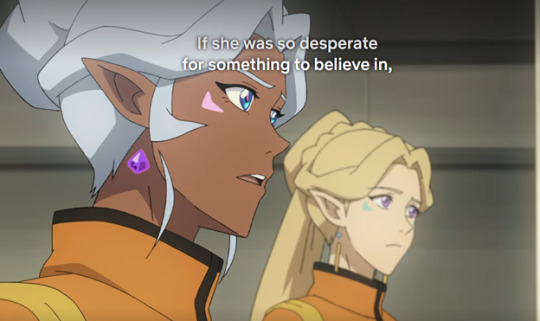
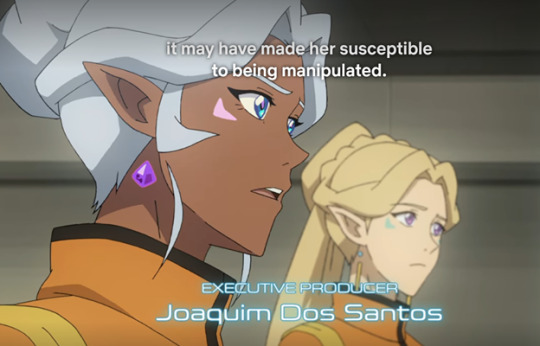
Allura herself had been manipulated in s3, wanting so desperately to not be the last Altean alive that it initially blinded her to how Commander Hira was manipulating her. The plight of the s8 Alteans who are deceived by Honerva is inherently frustrating to her, because she can see herself in them.
Absolutely none of this correlates with Allura seeing or perpetuating Alteans as a superior race. At every turn, her own people continue to disappoint her, and she increasingly and progressively separates herself from them in hopelessness, because they’re so brainwashed that they can’t see they’re just cannon fodder for someone else’s military agendas. Not exactly a ringing endorsement for a superior race, lol.
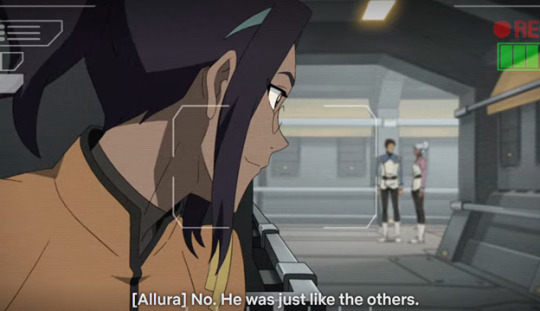

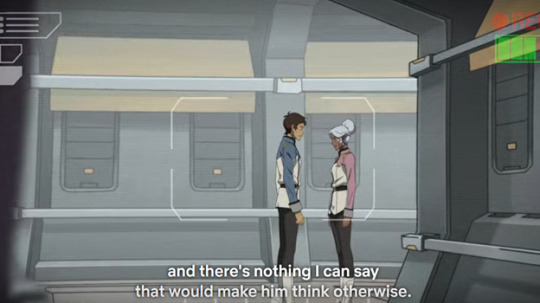
So let’s think about anti accusations here. Allura is a racial supremacist…but she’s arguing against her people who believe unquestionably in Honerva, another full Altean like herself? Nothing about that accusation makes sense with her actions.
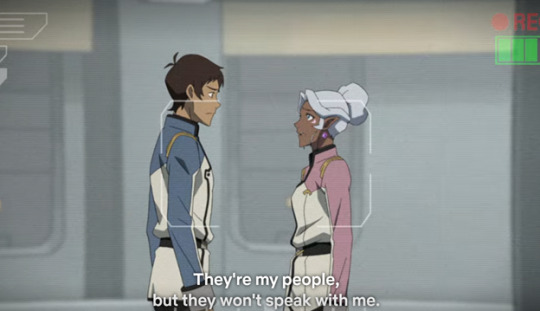
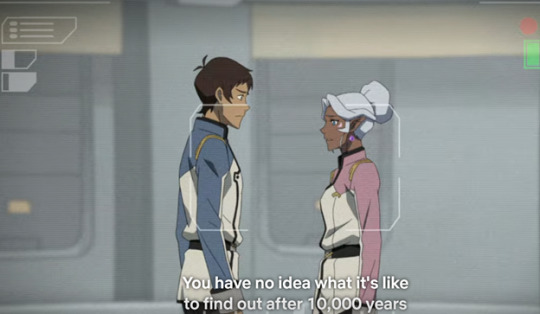


The fact is, consistently from season 3 and onward, Allura is faced with her own people morally disappointing her.
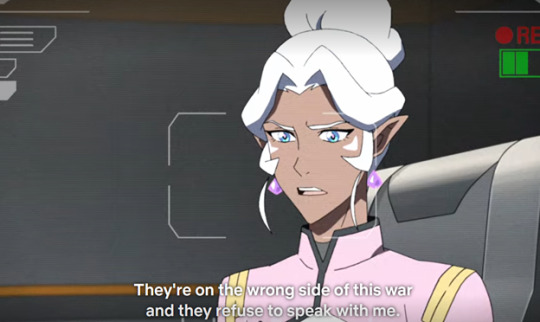
The good news for the s8 Alteans like Tavo is that Allura is able to remove the dark entity Honerva is using to control him. Which allows other Alteans to “wake up” from being manipulated and try to make amends.
Regardless, Allura makes a very clear line that simply being Altean doesn’t make someone “right.” She sees herself fully at odds with her own people who are drawn in by Honerva’s lies. And she experienced well back in s2 (revealing Haggar as Honerva) and s3 (evil AU Alteans) that any given race, including her own, can house people who do bad things.
The fact is, she’s consistently and willingly drawn weapons against even her own people when they didn’t meet her moral expectations. So her response to Lotor isn’t particularly out of line there. She’s repulsed by a moral flaw.
And actually, Lotor himself wouldn’t have known this, but he very oddly echoed the AU Alteans by getting angry that Allura was angry over the means through which he was trying to get peace:
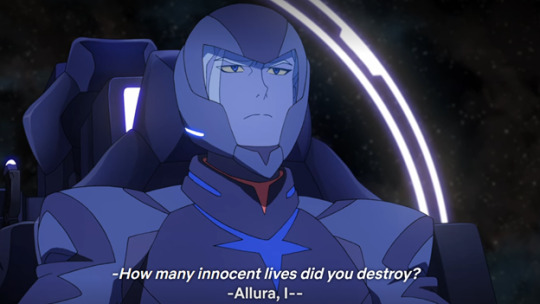


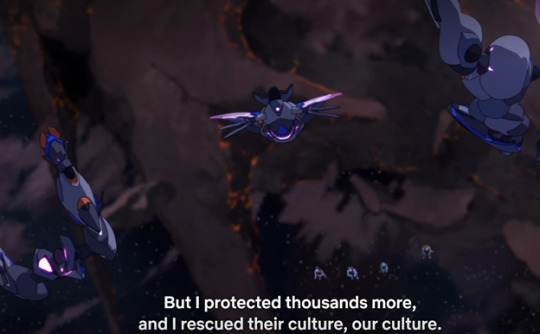

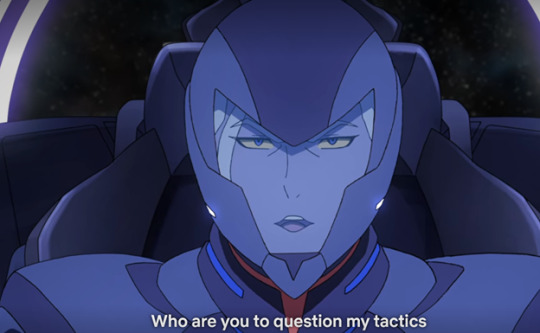
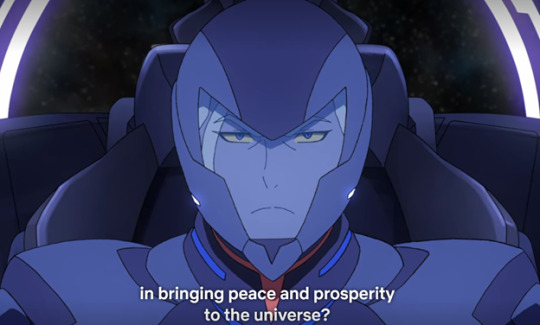
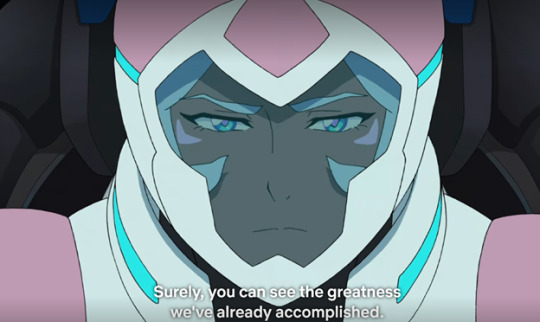
So Lotor actually reverts to the same logic of the AU Alteans—peace at any cost, just look at the results—
And keep in mind that the AU Alteans also manipulated Allura’s excitement about them, to get her to make the transreality comet usable so they could go into other realities. So Allura has felt betrayed and used before, by her own people.
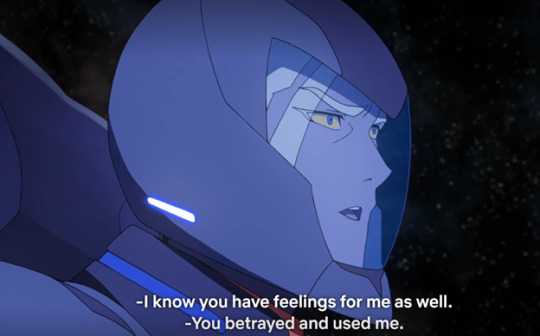
So when she says this:
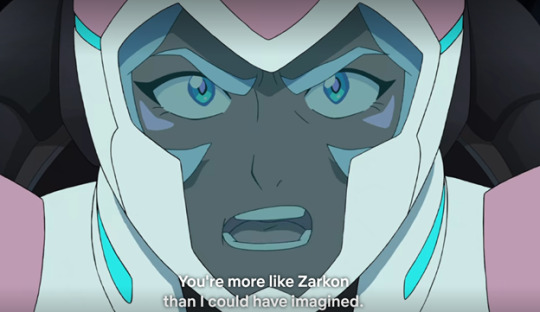
Yes, it’s a reference back to how Zarkon manipulated his friends in order to get access to the quintessence field, at the explicit cost of potentially killing his own people. But it’s not without understanding that yes, Alteans can be just as manipulative and betraying as Zarkon. Because she’s experienced it, again and again.
As a matter of fact, six out of the eight seasons of Voltron: Legendary Defender feature villainous Alteans/Alteans on the wrong side of the war, and we continuously see Allura punished again and again for wishing that Alteans still lived.
No wonder she wanted to die.
This is something that I find uncomfortable about the narrative of the show. Previous iterations of Voltron did in fact have a “blood on everyone’s hands” perspective, such as within the ages 16+ Dynamic Comics. However, Arusians/Alteans in those old Voltron narratives were not victims of genocide. VLD turns Alteans into victims of the worst racial crime possible and then also consistently portrays them as inherently antagonistic to genuine peace efforts in some way, instead of focusing on the evil of the oppressors.
And this is such a double whammy for Lotor’s characters as well, given that he was abused by his parents and threatened with slavery via his Galran culture, and that he was half-Altean too trying to connect to his lost culture.
As a matter of fact, the larger show’s narrative interest in “victims as antagonists” makes it such that when we see victims try to enact actual justice, it feels almost jarring. Let’s look at that s8 Zarkon moment you brought up as an example, where Allura destroys his innocent perspective by showing him his evil deeds.
The s8 Zarkon is a weird topic because 1) This Zarkon actually doesn’t exist outside of Honerva’s mind, so how he has any kind of actual free-will is beyond me, unless someone wants to argue that Honerva actually cursed his true soul just as she cursed the other paladins. It’s hilarious too, because Honerva-mind-Zarkon also calls Honerva a psychopath, so I guess now Honerva is psychoanalyzing herself using her dead husband as the vehicle, while also discreetly helping the paladins to stop herself—
ANYWAY, using this Zarkon as a “proof” of Allura’s “racism” is also cherry picking in the weirdest of ways. Is she angry about his horrific and incalculable crimes, including even how he betrayed the OG paladins and ruined his own planet? Absolutely. Does she want him to be aware of his crimes instead of having to pretend like nothing’s wrong? Yes.

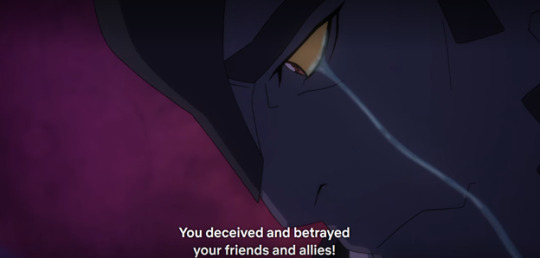
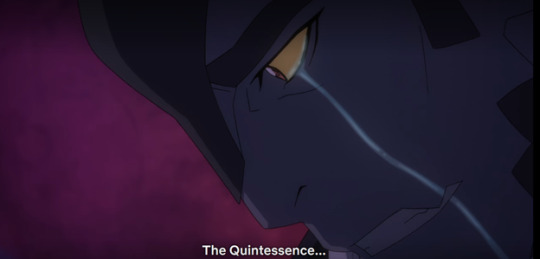
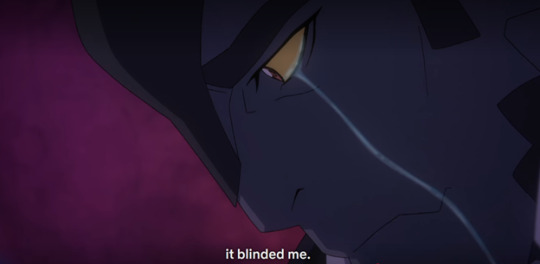
But notice here, this Zarkon actually shows remorse. He is actually crying over those memories and recognizing that he had done something wrong. And Allura can work with that. In fact, out of everyone standing around and doing nothing, it’s Allura who gives him a second chance and offers an alliance with Zarkon in order to stop a crazy Altean:
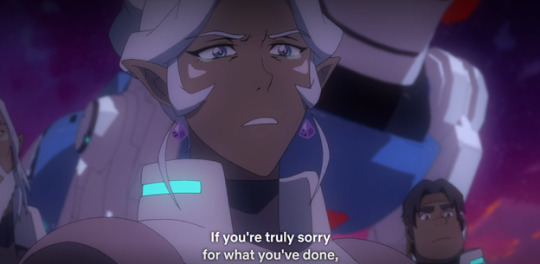
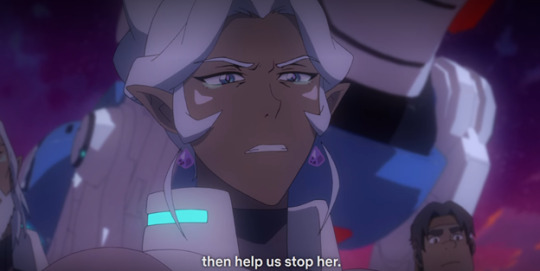
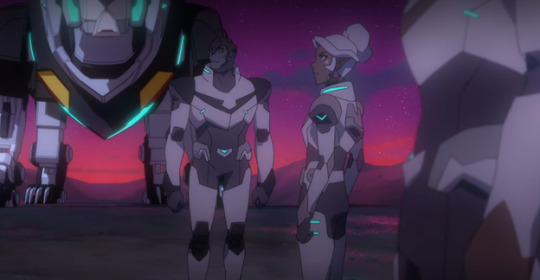
Keep in mind too, Honerva didn’t have memory loss at the end of s8. She knew exactly what she’d done and had given up and had to actually be convinced to do anything halfway constructive. That’s a very different circumstance than mind-Zarkon had, who jumped at the chance to do something to fix what all had happened, and gets even morally righteous about it, calling his own wife a psychopath, lol.
So generally, antis who believe Allura was a racial supremacist haven’t watched the show holistically. We see her hold the same standards to her own people as she expects out of others. This show would look incredibly different if Allura were a true racial supremacist.
Ah, you ask. Okay, so we’ve refuted the big pieces of “evidence” used to incriminate Allura. But what about all of those weird details about ancient Altean history? The violent language-learning program that scared Pidge? The violent terraforming tech that almost kills Voltron? The concept that Alfor tried to play “police” over the Galra and actually blew up their planet? The Alteans’ ongoing discussions of “peace and diplomacy” and spreading it throughout the universe while they happen to sit on a massive load of ancient power?
The s3 finale and other facts throughout the series very heavily smash the claim that our canon, in-universe Alteans were evil colonizers like the AU Alteans. The biggest piece of evidence to the contrary is that the Altea we know was one (1) planet. You counted right. One planet. Not an empire, but a singular planet. The s3 finale corroborates this, showing Altea as being largely isolationist from a military perspective while Daibazaal and Nalquod warred "for generations," right in front of their salad.

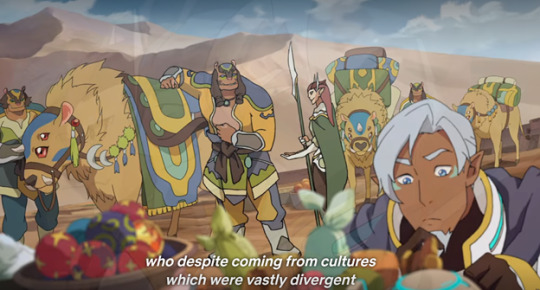


So some viewers would have you believe that Alteans were these big bad, intergalactic police state colonizers. But for all of its great power and knowledge, the singular planet of Altea didn't even canonically interfere in the wars of its own galaxy for actual millennia? And looking at the screenshots upon the stabilization of the alliance, Alfor is revealed to not have had experience with a neighboring culture. His face while exploring Gyrgan’s homeworld is an indication that it’s all rather new for him too. So again, we have evidence showing that Alteans were not colonizing or even functioning as a police state.
Note here that in the s3 flashbacks, the show confirms that it actually wasn’t just Alfor who suggested an alliance. All five leaders had common interests in protecting their galaxy from even worse threats, so all five came together at the same time. This is actually the first piece of evidence we have of Altea entering into some kind of intergalactic military agreement to stave off said worse threats.
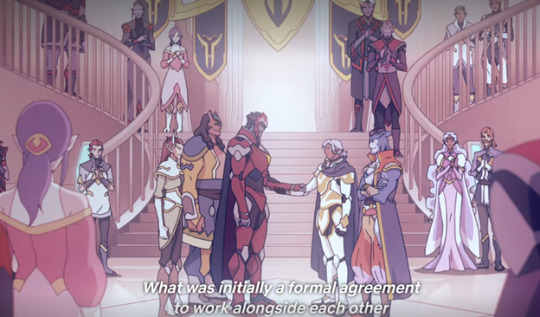

And all of this is on top of a history where in s6, the Galran Archivist confirms that the Galran Empire had existed before Zarkon for 3,000 years, with times of “expansion.” It’s very easy to see that Blaytz’s people were actively fighting off Galran occupation of their homeworld within this past.
And that’s actually what I think makes Alfor and the OG paladins some pretty interesting characters. Here, we had colonizing Galran empire setting down its sword and accepting the value and space of its neighbors. Here, we had master alchemist Alfor giving up military power within their group by acknowledging Zarkon as the superior strategist. Here, we had Blaytz who had previously been battling Galran occupation…fully accepting the Galra?

So the OG Paladin backstory represents a pretty incredible alliance that removed a lot of intergalactic toxicity and helped heal broken bonds. But it required all five leaders to agree to that. Alfor did not throw his weight or power around within this. There were several checks and balances here.
But this backstory also helps to explain some of the quirky details about Alteans. Their planet existed within an active war zone, and it’s very likely that they’d had to fight off Galran occupation just as Blaytz’s people did. So the violent robot trainers and fear-based language learning systems start to make sense. Alteans weren’t just simpering people playing harps all day and eating grapes. They were actively prepared to defend their planet and their culture.
So when Allura says in season 1 that Alteans were “spreading diplomacy” across the universe, the only pieces of evidence we have of that is the OG paladins themselves, in which Alfor was a big part in creating that alliance—and then possibly the Alteans with the Balmerans, given their deep collective rituals with that planet while the Galra literally just came in and ripped the planet nearly to death. Allura tries to mimic what it means to accept and interact with a culture without changing it well in season 1, when she stumbles through trying to respect Arusian culture and its demands on its people. Also, there is a big fact that antis like to overlook:
The fact is, despite the untold numbers of civilizations we interact with across 76 episodes, no outside race remembers Alteans as evil colonizers. If they were really so big and bad, we would have heard it, like, “Man, yeah the Galrans are bad. Just as bad as those Alteans, back in the day.” Or something. But nope, nothing.
So I heavily question the history of Altea as an ancient colonizing race. If they were, then Altea wouldn't have just been a single planet with limited resources to fight wars in even its own galaxy. All of this supports the idea of Altean children being raised to fight--because they were preparing to defend themselves when/if diplomacy fails.... But the fact that the Balmerans see Alteans fondly and that literally every other race we run into is explicitly suspicious of Galrans and not at all of Alteans says something.
I think the only piece of evidence there might be for a genuinely colonizing ancient Altea is the use of terraforming technology, as mentioned in s4. Haggar discovers it and activates it to try and kill Voltron--and she nearly succeeds, because said tech destroys the entire crust of the planet to reform it. But you have to step back for a second and wonder--if ancient Alteans were so powerful, why was Alfor struggling so hard to even hold his own planet together in the midst of all these other cultures warring and larger threats? If they had this technology--and they did know about it because Allura recognized it right away as ancient technology--why the heck wouldn't they use it? Or were they using it, and it was to reform uninhabited planets to help sustain displaced peoples? Why is it, if Alteans were so terribly bad, we have no record across ANY of the many alien races being cautious of them? Even Galran Lieutenant Lahn snapped at Allura only because he was jealous of the general security she had back on, you guessed it, explicitly Altea. There's a lot of potential explanations for a positive use of terraforming technology, and the evidence against colonization and Altea committing omnicide against other races is incredibly more aligned with the other details in the canon.
And even Alfor’s creation of Voltron and the blowing up of Daibazaal—that’s something that antis like to position as evidence of his police-state ways to underhandedly control other cultures.
So let’s tackle those too while we’re at it.
Honestly, I know people like to hate on Alfor, and I do think his character picks up some misogynism just from the writers....But I don't think he was as much of a controller as people think he was. He was already in an alliance with four other leaders to try and stop bad things from happening in their galaxy. That meant they were expending incredible amounts of time and resources to accomplish that end—resources that were not renewable and may have been straining various planets. We know that he started building Voltron with Zarkon and everyone else's blessing because he called them "clean ships," but it's only after the rift creatures attack that suddenly Alfor's perception of Voltron moves from "clean energy" to "omg we need a more powerful weapon against this unknown enemy.”
So these are his intentions BEFORE he discovers rift creatures are a threat to the universe. While Zarkon states that these new ships are to be endlessly powerful for the Galra Empire, Alfor shames him by offering what his desire is for them:
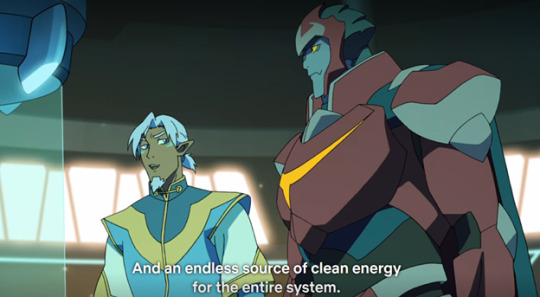
After the rift creatures nearly destroy Daibazaal, intentions change.

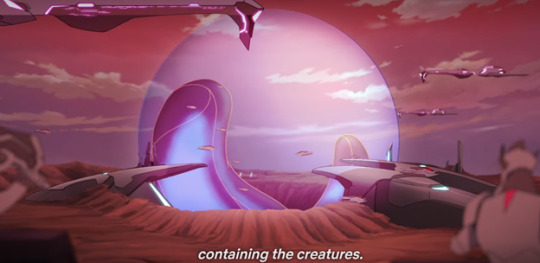
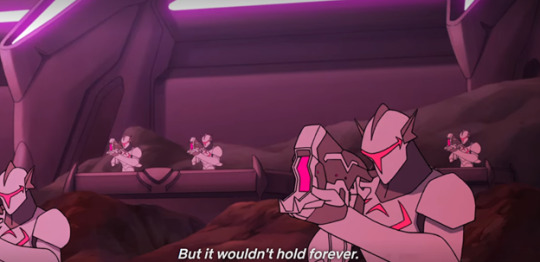
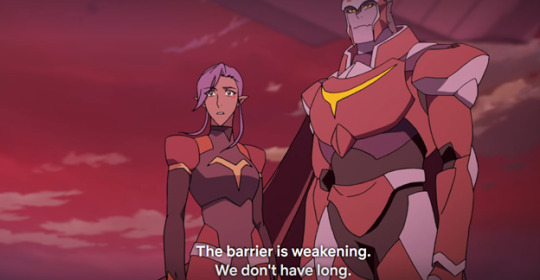

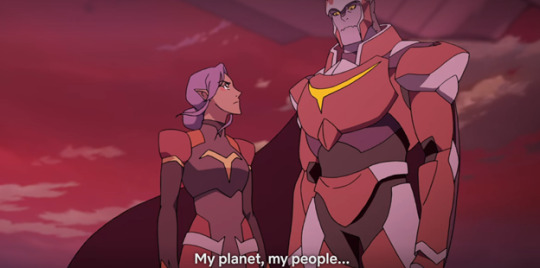

So here, we see the game change in a BIG way. Voltron is not just about offering a more renewable way of sustaining peace-keeping efforts. Alfor is now adjusting and finishing these ships with the explicit knowledge that if they are not powerful enough, then Daibazaal and the Galran people will die. Alfor’s got a LOT of pressure on him now to deliver a mighty and powerful weapon to stop this new threat. So even his creation of Voltron as a superweapon involved using it to protect people from imminent death—not to police them.
And about Alfor blowing up Daibazaal—once again, it’s Alfor trying to clean up Honerva and Zarkon’s mess. Honerva had convinced Zarkon that the rift needed to be wider, and so Zarkon deceived the paladins into widening it.
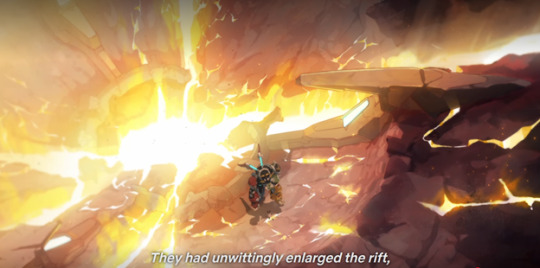

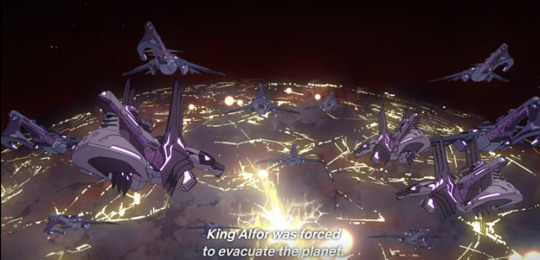
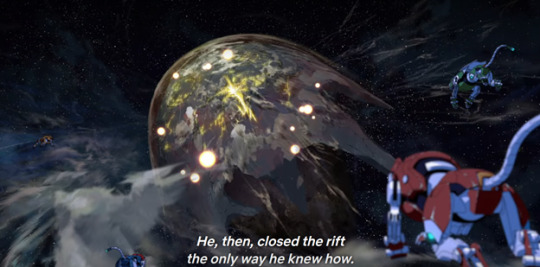

So keep in mind here, at this point in time—the rift was destabilizing and eating an entire planet. The entire universe was now at stake. Alfor had to choose between a bad fix and an even worse option of allowing everyone to die, but he very clearly evacuated people before destroying Daibazaal, as part of his promise to keep Galrans safe. So that no one would have to die.
And as a matter of fact—about that terraforming technology. How sure are you that Alfor didn’t intend to use it to build Galrans a new home? It’s entirely within the realm of acceptable conjecture that he allowed for the existence of that technology because it could restore what had been lost.
And here’s where the story gets really screwy and feeds into some anti hate. Because when Zarkon wakes up as a zombie, he desires more quintessence as zombies do.
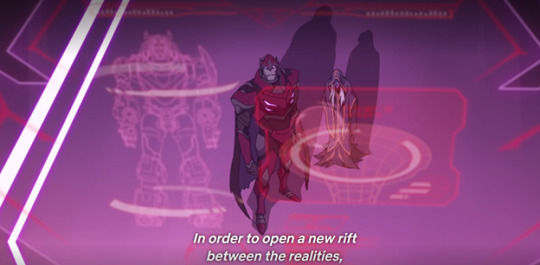

So he’s pissed that Alfor just cut off his gateway, and he manipulates his people:


And it’s here where we get the idea that Alfor was an evil controller. The idea came from Zarkon, who—we can look around pretty easily and see that he was not a man of honor, ultimately. Even if you chose to not believe the s3 finale flashbacks as being objective, there’s something wrong with Zarkon. (It’s clear that the show thought using Coran was a smart way to shell off massive amounts of info, because clearly if this were truly in Coran’s perspective, we would NOT have had intimate looks into Zarkon and Honerva’s bedroom as Zarkon is tending to her, like omg.) Numerous sources, histories, and cultures outside of Coran confirm that Zarkon hit a point of no return on the evil scale, and that he projected his own blame for Daibazaal’s destabilization onto Alfor in order to raise up his new regime in the name of Quintessence™.
So at the end of the day, even Alfor was a victim. But yet somehow, various antis choose to believe Zarkon’s victim-punishing narrative because said antis can’t or else refuse to connect one scene to another since it undermines their justifications for why they can hate on Allura. And that’s not so much an issue with the story itself as it is just poor critical analysis or malicious weaponization of content against other fans.
Now, at this point, we’ve talked about Allura and we’ve talked about Altean history. I have numerous other posts about Allura’s interactions with other races and Galrans and overcoming trauma to give the entire universe a second chance. So if there is anything in this show that suggests Alteans were in any way a superior race, then it’s probably within the show’s own worldbuilding. The show contradicts its own definitions of what quintessence even is by suggesting Alteans have “bluer/purer quintessence” in order to justify why Lotor would even be trying to sacrifice them for anything. The show-championed concept that Alteans have a bluer, purer life force above all other people, and that only Altean energy could interface with the fabric of space-time. Now, this is a problem in the later seasons’ world building itself. And you know who wrote that in? The production team. So once again, we do have racial issues in this show, in ways that shows like Star Wars desperately try avoid by showing racial diversity in who has Midi-chlorians.
That said, I’m not a perfectly woke storyteller either. I think every story and show is going to have something problematic™, but with VLD it’s very clear that its disrespectful handling of genocide politics and shatterglass conspiracy theories, on top of its weird master race angle created the perfect storm. These mishandled and quirky details have created a cognitive dissonance with the provided narrative, resulting in some people in the anti fandoms to champion what aligns very closely to actual neo-Nazi propaganda against Jews, who according to them are not victims but instead the true perpetrators of all bad things. For the sake of the antis, I’m pretty sure they’re not intentionally looking at VLD this way and are probably just looking for any easily graspable reason to hate on Allura for interfering with their ship or something.
But this kind of subliminal propaganda that undermines victims, and the effect it has had on fandom morality politics, is deeply concerning to me. I really wish that we’d had an opportunity to respectfully and critically discuss this with the production team of the show, because a Y7-FV show about “strength in unity” should NOT result in us needing to have a conversation about people walking away with neo-Nazi-ish propaganda sentiments against genocide survivors. Like. Clearly, VLD is fictional, but it’s feeding into a real-life beast that it does NOT need to feed. And it’s keeping alive ongoing conspiracy narratives against some of our most vulnerable populations on the planet.
So, we need better stories. We need a production team that, if they’re going to get paid to do something involving portrayals of genocide and politics, that they need to do their research on those topics. Nobody is going to be perfect with a creation, but VLD validated some very damaging things—and it ALL is something that could have been fixable. I think it would have been incredibly validating to hear the production talk about and accept that these were issues that cropped up unintentionally, and to hear them confirm that these issues are not the sorts of things that VLD was supposed to champion.
The greatest tragedy of all of this is the potential that this show had to really champion some great and validating messages, and the potential that we as a fandom had to come together and do something that fandom was meant to do—which was celebrate the things we love. Because that’s why we’re all here. That’s why this crazy tumblr of mine even exists. It was supposed to celebrate things.
For that reason, I’m going to end this here. I’ve written several responses now as to my thoughts on the inappropriate narrative lens of the show, its contradictory and damaging worldbuilding about the purest race, and how it champions demonizing or punishing genocide survivors again and again. Within all of that, I’ve talked at length about Allura’s character and behavior over 8 seasons and how she built even empathetic connections with militant Galrans like Commander Lahn. In fact even her own homesickness is how she emotionally connects with Lahn, because she understands that desire to call something one’s own. To have a home. A family.
I now really would like to get back to writing stories that I find meaningful to me using these characters and these worlds—and trying to find the hope in all of this darkness, haha. And maybe with any luck, I can hope to do VLD some justice, knowing that I am still on a learning journey as well.
But I appreciate your note, and I hope this very extensive response helps to settle your questions and concerns once and for all regarding VLD Allura. If you should have any remaining questions, please feel free to reach out via a private message to discuss. Thank you!
#Volron#VLD#Allura#VLD Critical#Alfor#Zarkon#Honerva#Lotor#I hope this helps explain my perspective#I think this might have to be my last refutation to the Allura as racist/racist supremacist conspiracy theory#at a certain point#people either watch the show holistically or they don't#you can't convince an anti#so this meta will probably not help an anti#but if you're sitting on the fence and felt drawn in by anti propaganda#then I hope that maybe this post provides an alternate perspective#and one that tries to be more holistically fair to all 8 seasons of the show#and to the intentions and general oversights that can occur during production#Ultimately it doesn't matter if someone likes or dislikes Allura as a fictional character#we need better entertainment that can handle these hard topics and handle them well#And we also need a fandom who's willing to look at all of the information and not weaponize it to specifically demonize and silence others#Maybe a family TV show shouldn't be appropriating conspiracy theories from the Protocols of the Elders of Zion#real-world fans are incredibly vulnerable to such conspiracy theories#and it creates a lot of real-world strife as a result
22 notes
·
View notes
Text
Kent Monkman: In Conversation with Marcus Brock
for The Tenth. Orig. published in Winter 2018, Issue No. 5, The Romantics
Words by Marcus Anthony Brock
Romantics are renaissance people, so our days are often blurred by the many things that engage our talents in any given moment. I willfully enact as much mindfulness for people as I can muster when the day requires it of me. We all need a witness—me included. Kent Monkman stopped me in my tracks and I was ever-present as soon as he uttered the first answer to my first question. He’s lauded as “about as famous as a living painter can be in [Canada].” I read about Canada’s grim history for the past 150 years with the Indigenous people there. I looked closely at images of paintings like Cash for Souls. Ironically, I had recently re-watched a precarious and insensitive press conference with Donald Trump honoring Navajo war veterans that week, so I already had one question in the bag for Monkman.
I think what follows is more than an interview, but it’s a moment of pause. It’s a conversation. It’s truth-telling and truth-baring. It’s a document left behind so that when they write us all down with their “bitter twisted lies,” some queer hero will be in an archive and discover The Tenth—and that queer hero will discover these conversations.
They’ll land on Kent’s work like I did. And they’ll land on the power of intention and the truth about where we come from so that we remain resilient in our quest for liberation. If anything has taught us about histories, it is that liberation from ourselves or others is an ongoing battle, rarely settled in this one life.
________________________________________________________________
Marcus: I want to ask you, as a painter, as an artist, why do you choose not to shy away from specificity? Your work is specifically political and revises history?
Kent: Well, I think it's really important to have your perspective rooted in a very specific time and place. I know there are Indigenous artists who tend to downplay their Indigenous identity because they feel, in the mainstream art world, it could be seen as a liability. That doesn't make any sense to me because the whole point, I think, of making art, is to communicate and to transcend barriers, to break through, to create new ways of seeing, and how are we going to do that unless we speak truthfully about who we are and where we come from?
Yeah, I think there are certain obstacles in the way, but that has to do more with how the mainstream art world functions and how the gatekeepers kind of tend to feel more comfortable with a certain dialogue. It's really about their level of comfort, not mine, and I don't really want to ascribe to that. I really feel like I want to reach an audience that is as wide as possible, not necessarily just people in the art world. I know a lot of art writers and curators, they gravitate towards a certain kind of art-making because it's within their sphere and level of comfort. I want to put them out of their comfort zone and I think that's what, for me, what art making is about.
Marcus: It’s difficult to get away from the politics at times. The politics, whether we like them or not, whether we address them or not, whether we consider ourselves political or not—they’re always present. I would like you to speak to this idea of New France, New York, New Amsterdam, all these different ideas about colonialism and settlers coming over from Europe, and basically reifying things and calling them new, but understanding that aboriginal or Indigenous populations were already in existence. How does your work address that tense history?
Kent: Well, I think my work has been about challenging those limitations of that European settler point of view. The intention is people still follow sight of how Europeans want to frame and see the world. There have been major gaps in terms of our cosmology, how we see the world, how we want to live, how we see our relationships, how we see the land, our relationship to the land, and everything is just almost diametrically opposed. You have European points of view where everything is to be commodified and possessed, and turned into money. Indigenous people don't think like that.
They don't think about the land that way. They don't think about people that way. I know contemporary Canadians are constantly frustrated with Indigenous people. "Why don't they want to develop their land? Why don't they want to do this? Why don't they want to do that?" A lot of it just has to do with how Indigenous people would prefer to live.
Now, that's not to say that all Indigenous people think the same way. Obviously, in the United States, there are tribes that are opening their land for all kinds of development, and that happens in Canada, too. But, I think at different times, Europeans came, (they've been coming here for hundreds of years) and over those periods of migrations, there's been this desire to come in and take, and repossess, and rename. I think the worst part was the period of modernity because the period of modernity really espoused a willful amnesia about the past. I can understand Europeans wanting to leave their oppressed social and political conditions in Europe, and seek something new and fresh in North America, but those values of amnesia and that detachment from tradition, and the detachment from the past, when that was hoisted onto Indigenous people, it had a devastating effect because we didn't want to lose our traditions. We didn't want to lose our connection to our land base. We didn't want to lose our languages. We didn't want to lose all of these connections to culture.
I really point the blame on recent history. I point the blame at modernity and the values of modernity, but as you said, this was something that the Europeans have been doing for hundreds of years. That's part of the colonial mandate and that's how Western society and Western culture operates. They just kind of sweep in and try to amalgamate everybody into their culture. It's a very voracious culture. At the same time, what's interesting about this culture is that it also wants to have a frontier where the other remains on the other side because that means there's still somewhere else to go, and pillage, and plunder, and to explore. If they feel like that frontier barrier is gone, then they no longer consider, even people at the edge of that frontier.
As Indigenous people, we're constantly facing that because you have Europeans looking at you, or North Americans looking at you, saying, "You don't look very Indigenous. You don't do this? You don't do that?" and, "Why aren't you more authentic?" That's the other flip side of this voracious appetite that Western culture has to amalgamate everybody into it. They wanted to turn Indigenous people into Canadians. They wanted to strip them of their languages. They put Indigenous people into residential schools, and they tried to strip away culture. At the same time, there's this romantic appetite for this other, which remains on the other side of this frontier. I still see it as a form of primitivism. It exists in the art market; and it exists in different levels of society. It’s a real problem.
Marcus: Your take on the residential schools and stripping culture away reminds me of your painting, The Scream. Who's screaming? Who is the scream for? What is it for? What does it represent for you?
Kent: Well, that painting is part of the current exhibition which is touring Canada right now, Shame and Prejudice: The Story of Resilience.
It's one of nine chapters, where I really tried to encapsulate the last 150 years of experience here and the Indigenous experience in North America, generalizing it into these different chapters. When I thought about residential schools, that was a very important chapter because it was a colonial policy that really had to do with assimilating Indigenous people into Canadian society. Across the border, you guys had boarding schools in the United States. So, it was really about turning Indigenous people into regular Canadians or regular Americans. The idea was that they just wanted to eliminate the Indigenous cultures and take away the languages—remove the relationship of the children to their parents and grandparents. It's really that forcible transfer of children from one group to another, which is one of the definitions of genocide.
When I thought about that chapter, I really wanted to find a way to communicate at least one part of that experience. Instead of making a painting about children in the schools, I decided to really focus on the removal of the children because the emotional impact that, that would have on the parents, as well. If you want to destroy a mother or destroy a family or destroy a father—take away their children.
Marcus: I think the emotional impact gets into the space of what you call intergenerational trauma, right?
Kent: Yes.
Marcus: Intergenerational trauma doesn’t disappear. Your exhibition, Shame and Prejudice is running concurrently with the 150th anniversary of Canada. Now, as we celebrate the birth of nations, we are ironically celebrating the death and slaughter of nations as well. Can you speak to this?
Kent: Well, this exhibition was created to be a counter-narrative to the celebrations that Canada was having in 2017, celebrating the 150th year, but that ran concurrently with the period of modernity. So, I was also drawing up on the values of modernity and the art, the idioms from the period of art, modern art, and using those as allegorical ways of understanding the compression of space as a way of talking about the compression of culture, and the compression of Indigenous people. We now live in %0.02 of the original lands that we inhabited, you know?
It's the physical compression of space, but it's also this metaphor for how Indigenous peoples, our cultures were flattened and compressed through colonization. The last 150 years have probably been the worst because this includes the beginning of the reserve system. There were no Indian reserves. This is an artificial construct; it's a policy of the Canadian government and the American government, to force Indigenous people into smaller and smaller tracts of land. Then it was also the beginning of this legacy of incarceration.
In Canada, up to 90% of the inmates in our prisons are Indigenous people—in places like Western Canada, Prairie cities, and Northwestern Ontario. This is the reality of Indigenous people, that we have been institutionalized by the government in various ways. Children are taken into the foster care system, people end up in institutions because of this trauma that has been inflicted, and it is intergenerational. Our communities are still reeling and reverberating from these intergenerational effects that happened because of the residential schools.
Marcus: On that note, I'd like to go back to some of your earlier work, right outside of your studies at Sheridan. In 1991, you had an exhibition, Discovering Ourselves, Not Columbus. Can you take me back there?
Kent: Sure. It was exciting for me to show outside of Canada and as a young artist. I was trying to find my voice, and trying to find a way of making my mark as a painter. I had kind of accepted that painting, in its highest form, was to follow the path of the abstract expressionist. I thought that it was the most sophisticated language because it didn't rely on representation imagery anymore.
That was kind of where I was at when I showed there, and I was trying to find a way to communicate a very complex experience. I was trying to find a way to communicate some of the layers of what it means to be an Indigenous person. Ultimately, ten or 12 years later, I was completely frustrated with the abstract vocabulary and I dropped it, because I felt like it wasn't capable of communicating to a wider audience. Not necessarily even just an art audience, an abstract painting, for me, had become a reductive vocabulary. It was very highly personal and a bit cryptic, and people were being left outside the work, so I was actually failing to communicate some of these themes that were becoming very important to me, which relate to the impact of colonization, colonized sexuality, and the homophobia that is in our communities because of the influence of the church and Christianity.
At that point, I just completely shed all that baggage from the abstract expressionist, and I asked myself, why was I painting like a white guy from New York, you know?
I started looking at art history and through the discovery of these paintings that really communicate the experience of the European settlers here in North America. I wanted to challenge that art history and so I became a representational painter. When I did that, my intention as a painter really shifted and I no longer needed to have that unique mark with paint that I had really been striving to create. I decided to disappear my hand in the work and just imitate the work of these artists, and to look at the work of the old masters, and I realized that all the old masters learned to paint by copying one another.
Once I embraced that shift in my work, I realized just how vast and sophisticated the vocabulary of painting is. The formal aspects like color, and the compositional elements, and the textures, and the surface quality all serve a larger purpose, which is to communicate a narrative, a much more complex deep final statement.
Marcus: I love the imagery that you're depicting with the vocabulary of painting. Speaking of vocabulary, let’s discuss the power of words. California has changed its Christopher Columbus Day to Indigenous People's Day and we see this coming up quite a bit now in the schools and the colleges in the United States. People are not willing to celebrate it in the traditional ways—such as when I went to school. What do you think about this step to remove the name, Christopher Columbus, from this holiday?
Kent: Well, I love it. I think that's a significant shift in terms of how the nation wants to revisit its own myth about itself. I want Canadians to address their own myths about themselves, their founding stories, their founding mythologies, and to go back and reexamine the leaders that came and colonized Indigenous people. Those leaders are still upheld, and their names are still on schools, and monuments. I think it's extremely important, but as an Indigenous person, it's not for me to tell them to take them down. I can only create awareness and help them arrive at their conclusions on their own. It has to be collective will, otherwise, Indigenous people will just attract more negativity if we start trying to tear down their leaders and their heroes before they're ready.
It has to come from the collected will of the nation itself. I really just want to help them arrive at these conclusions on their own, and to understand that the foundational myths of this country are flawed, and that the policies were brutal. This is part of my mandate with this exhibition, is to really reach out to Canadians and give them an experience, an emotional experience, an intellectual experience, an artistic and spiritual experience, with the work. That's what we need to move forward, is that the past must always be revisited, it must always be re-contextualized as we move forward and become better human beings. Why can't we all just strive towards becoming better human beings?
Marcus: Let’s return to your idea about the nations addressing their own myths and history. In America, President Donald Trump spoke at a White House ceremony to honor Navajo war veterans of World War II? During the ceremony and global press moment, he mocks Senator Elizabeth Warren, calling her ‘Pocahontas.’ Behind him is a painting of Andrew Jackson, responsible for the Indian Removal Act.
I know it’s a big question, but can you talk about the confluence of events in that one moment?
Kent: I don't even think I could really weigh in on that without excoriating [Trump]. I feel as though it's very telling of the American mythology that America has written about itself. That the cowboys came, they conquered, and they killed the Indians, or removed the Indians, and treated them like terrorists in their own land. That's so problematic in terms of the foundational myth about America. This is one of the things that I address in my artwork, is that art history reinforces these ideologies, and that reinforces and underscores these policies to remove people, to diminish people, to disappear people. I can speak to it on that level, I think that someone like Trump just believes that, and that many, many, millions maybe, in America, believe that, too. It's a flawed mythology and I can't even begin to speak to Trump because that's just too big of a subject.
Marcus: That's too big, for sure.
Kent: I can certainly draw the conclusion about the stories and the narrative that the country has told itself. We see it in the westerns, and in the literature, and it's just problematic from day one. You have Native American people that are still struggling for recognition on their own land, still struggling for sovereignty on their own land, still fighting for the basic rights to clean water. This is the same struggle that Indigenous people have in Canada, too. Even though our foundational myths are different, there's still a lot of quality of life issues in terms of how Indigenous people live in comparison to how the average Canadian might live.
Marcus: That's one of the aspects I love about your work, is it's ‘reappearing’ of people and having to have these conversations. There is a story of resilience that must be told. Also, you touched on the mysticism and mythology surrounding Indigenous people. When I grew up, and still today, especially in classrooms— Indigenous people were not discussed as humans, but as things that don't exist, or if they do exist, then they exist in these tropes, or to use one of your devices, tricksters, in the Hollywood world. How is your work challenging that mythology and rightfully inserting Indigenous people back into modernity?
Kent: Well, I know a lot of Indigenous artists have been dealing with these broad stereotypes that are very reductive, whether it's a cartoon character, or just a wooden actor in a Western. Those things have been called out, and they're demeaning, and they're reductive in terms of how Native Americans are perceived. There's still a long way to go, but I think what has been happening is, with the digital revolution, a lot of Indigenous people got movie cameos into their hands, and started to counter these narratives and these broad stereotypes that exist in pop culture and mainstream culture, that diminish Native American people and reduce them to these irrelevant characters from the past. I think most of the artists I know end up being saddled with the added responsibility of being educators, and I certainly feel that myself. It's not something that I set out to achieve or to even take on, but when you start dealing with challenging these things as they exist in our culture, that you have to dismantle and provide new paradigms and new examples, and new ways of seeing for the audience. These falsehoods are so entrenched in our education system that it really begins with how people are taught at schools, and it goes from there.
Someone who's non-Indigenous, who's just making art in the mainstream world, takes it for granted. They don't have to bring their audience along first.
Marcus: We applaud you for acknowledging and taking on that role, so that we can then take the work and actually put it into our classrooms, or put it into our museums, and put it into our conversations, for people to actually see and revisit that history. I'd be remiss if we didn't talk about queer romanticism in your work, or the queerness of your work. Can you romanticize your subjects and bring the audience along, simultaneously? I wonder if the burden is too great. Where does the two-spirited figure in your work, Miss Chief Share Eagle, fit into this?
Kent: Well, I created that character because I'd been working with these themes in my work, in an abstract visual or painterly language, and I wasn’t communicating clearly enough. I felt as though I needed a more direct approach to talking about colonized sexuality. Part of that process for me was just researching and learning about how queer trends, bisexual, gender fluid people existed in Indigenous cultures before contact. Sure enough, there was a place for these people in the 90s, when two-spirited was coined; but Indigenous nations have had names for the people that fell outside that male/female binary. Again, I wanted to share that with people. A lot of people didn't know that it was accepted, and revered, and widely found in Indigenous nations all across North America. It was also this desire to show that I was proud of the fact that Indigenous people have a place for LGBTQ people in our traditional thinking, in our traditional societies. I wanted to create a very empowered persona, someone that could reverse the gaze, and kind of turn that gaze on the colonizer himself, and objectify him. So, Miss Chief was born out of that desire to represent two-spirited sexuality, but also to represent a very strong and empowered person, that was deeply comfortable in herself, and in her sexuality, and in her gender, and within a cultural worldview.
Marcus: How does she fit into the larger queer narrative, in terms of People of Color within queer narratives? How does this figure disrupt so many different layers in queer work, in America, Canada, and beyond?
Kent: I think her different elements have different appeals. She's very glamorous, and she has this component of her that appeals on that sort of maybe superficial appeal. At first glance, she appears to be a drag queen, but she's not a drag queen. In a way, she fits part of that role, but she also comes from a very specific Indigenous point of view. I really wanted her to be someone that could teach non-Indigenous people about Indigenous thinking. As this character evolved, I continue to give her more layers. She emerged as this saucy, trickster character, but then she's almost become a supernatural being. She travels through time. I'm trying to give her more dimension so that she's not just a drag queen. When people ask me, "How would you describe her?" That's not how I would describe her, so I'd like to make that distinction, too, because drag queens typically are men who are imitating women.
She's not imitating anybody and she's not trying to be anybody else, she just is herself. I think that's the distinction.
Marcus: Is she existing somewhere between gods and between man or woman?
Kent: Yeah. Well, I'd really like her to be kind of ambiguous in terms of her gender. I'm quite comfortable that she is both male and female.
Marcus: Congratulations on your upcoming shows, which are scheduled to run through 2020. There is a lot of truth telling for people to see in the future, which is great. With that said, I’d like to discuss ‘truth and reconciliation.’ Do you think you're achieving that within your work?
Kent: Well, it's not for Indigenous people to achieve reconciliation, it's up to Canadians or North Americans, non-Indigenous people, to achieve that. What we need to do as Indigenous people, is to do what we are doing, which is to bring truth forward. That's our role, is to be truthful, and then be open and willing to Canadians when they want to become our allies, when they want to work alongside us and shift the country, to shift how we think about Indigenous people, and how we think about each other. The main brunt of the work remains squarely on the shoulders of Canadians and their elected officials. I keep putting it back to Canadians on some of these larger issues and asking them, “What kind of country do they want to live in?”
Marcus: How did the Cash for Souls chapter emerge?
Kent: That painting belongs in the chapter on incarceration. I've spent a lot of time thinking about why Indigenous people fill our prisons. It goes back to other forms of institutionalization. The fact that Indigenous families were ripped apart, people were traumatized, and then fell into mental illness, or crime, or situations where they became institutionalized in some form, whether the end of that be prison or something like that. I wanted a chapter devoted to, specifically, incarceration. Our prison systems do not work quite the same as in the United States, but America has a more privatized system, where prisons are essentially money making enterprises. People are getting wealthy from the incarceration of people.
There's irony that people, when they're in prison, become more spiritual, and a lot of Indigenous prisoners become much more in contact with their own traditional forms of spirituality. Again, I find that very sad, that they have to be in prison before they develop a strong spiritual life.
Marcus: I think the spirituality of your work is a beautiful thing because it will live on. You’ve said before, "I know when I've touched a painting just enough." You know when you've touched a painting just enough, but then it lives on for us to touch. Lastly, can you take me behind either the practical or esoteric meaning behind that statement?
Kent: Well, I think that comes right down to the actual technical aspect of painting. The thing I love about painting is, the more you do it, the better you get at it. I often quote Delacroix, because Delacroix's one of my favorite painters who talks about how painting actually takes the longest to master over music, or literature, or any of the art forms. Painting is the thing that is kind of like the lifelong quest to master and often, painters don't really reach their maturity until their middle age, and I really believe that's true. The more you do it, the more you realize how complex it is, and how difficult it is, and if you're really pushing it towards improving.
You don't want to touch it too much, you don't want to overwork it, you want it to look and feel as though it was made very easily, and that it still has a luminance and the freshness to it, and that's, to me, the aspects of great painting that I admire—that it doesn't feel labored. It feels as though the brushstrokes and the way that things are assembled in terms of composition, but also just all of the layers of paint, that it feels like it reaches a very complex point, but it also feels minimal. I think that if you can achieve that as a painter, that's what being a master, a masterful painter, really is about—is being able to achieve that effect with the sparsest means necessary.
Marcus: Let's see if we can achieve that in real life. That is the rub.
0 notes
Text
Pod Save the World
2017.09.20
Crisis in Burma
“Tommy talks with New York Times columnist Nick Kristof and Nexus Fund Executive Director Sally Smith about the ongoing ethnic cleansing happening right now in Burma.”
[MUSIC]
0:00:01
Tommy Vietor: Pod Save the World is brought to you by The Great Courses Plus.
Jon Lovett: The Great Courses Plus. You know, Tommy, we made a joke about The Great Courses when we were talking about the fact that Donald Trump is basically in school at UNGA learning about foreign policy.
TV: UNGA is his Great Courses Plus, Ruining the World. There are invaluable lessons, though, to be learned from our past, Jon. That’s why it’s so important to keep learning. And that’s what The Great Courses Plus is all about. They work with award winning professors and experts and make them available to all of us in their video lecture series. Get unlimited access to learn about anything that interests you in politics, world history, psychology. You could even learn a new language and you could stream or download the videos to watch any time you want, from wherever you are.
JL: Look, you’ve signed up for Tommy Vietor to help you understand foreign policy, so we know where your standards are.
[Laughter]
JL: Think about how much higher they could be with The Great Courses Plus.
TV: That’s why everyone should check out The Great Courses Plus series on history’s greatest military blunders and the lessons they teach. We’re maybe walking into another one in North Korea. We can highlight military successes, but there’s so much to be learned from studying our failures.
JL: Life lesson.
TV: That’s why you should check this out.
JL: Life lesson.
TV: Life lesson. We want you to try The Great Courses Plus, so right now we’re offering our listeners an opportunity to watch this and any of their lectures for free for one month. You need to sign up using our special URL. Go get your free month now at thegreatcoursesplus.com/crookedworld. That’s thegreatcoursesplus.com/crookedworld.
0:01:31
[MUSIC]
0:01:33
TV: Welcome back to Pod Save the World. Today’s episode is about the ongoing ethnic cleansing of the Rohingya minority in Myanmar. Some people call it Burma, the names are gonna be used interchangeably throughout the interview. The Rohingya are a Muslim minority group that practices Islam in the Rakhine State, which is one of Myanmar’s poorer states. They have their own languages, they have their own cultural practices, and unfortunately are the victims of some of the worst discrimination you can imagine. This discrimination comes in a number of ways. The Rohingya are attacked and oppressed by the Buddhist majority for being Muslim, based on their religion. They’re also being falsely accused of not being from Myanmar. It is a truly vicious version of the familiar nationalism that’s turned deadly in so many different countries. Samantha Power, who was Obama’s ambassador to the United Nations and wrote a Pulitzer prize winning book about mass atrocities and genocide, told me that this was a degree of prejudice that she had rarely seen in all of her travels. In recent weeks, this situation has exploded. And to be honest, I didn’t have any idea how bad it had gotten until I started researching for this episode. My experience working on Myanmar had been very different. I visited the country with President Obama back in 2012. He was the first sitting U.S. President ever to visit the country. I was there when he met with Nobel Peace Prize winner Aung San Suu Kyi, who was considered by many to be the Nelson Mandela of Myanmar. We were at her lakeside villa where she had been kept under house arrest for many years. The day he met with activists, organizers, dissidents, he gave a speech at the University of Yangon, it felt like the opening of a new era for the country and the people of Myanmar and it truly felt historic. It still may turn out to be a historic opening and visit. But the situation today is far from hopeful. It is in fact horrific. The military is driving hundreds of thousands of innocent Rohingya men, women, and children from their homes. They’re burning down their villages, they’re indiscriminately slaughtering them along the way. It is undoubtedly ethnic cleansing and some are calling this a modern genocide. So today’s episode is based on interviews with two experts who helped me understand the situation on the ground. We recorded the interviews separately, but edited them together to give you multiple perspectives on the situation. You’ll hear from Sally Smith, the executive director of the Nexus Fund which is a non-profit organization Sally founded to prevent mass atrocities, and Nick Kristoff, a Pulitzer prize winning for the New York Times who has spent his career documenting human rights abuses and injustices around the world. It’s not easy to read or hear about some of the things that are happening. It’s not easy to hear this episode. But the violence is happening right now. And there’s still time and there’s still a chance for the international community to put pressure on the government of Myanmar and force them to stop. And there’s time to raise money to get aid to people who are suffering and who desperately need our help. For more information about the situation and how to help, go to the Pod Save The World Facebook page or go to the Nexus Fund website at www.nexus-fund.org to donate. Thanks for listening, we start with Nick Kristoff.
0:04:23
TV: I’m familiar with the Rohingya, they are a Muslim minority group who lives in Burma, or Myanmar. I was aware of the history of discrimination they faced and some of the awful treatment. But it wasn’t until I read a piece you wrote, a couple weeks ago now, about just how bad things have gotten, that I truly understood the degree to which they were suffering and being driven out of their country. Can you talk a little bit about what has happened recently that has gotten this crisis to such an acute level?
Nick Kristof: Sure. So the Rohingya have been persecuted for years and years and years. And disenfranchised and this gradually radicalized them. And so an armed group appeared among them with a somewhat crazy idea that they were going to find back against the Myanmar government. And so a year ago, half-heartedly, and then in August, more vigorously, they attacked Myanmar government institutions – police stations and an army base. And it wasn’t effective at all as an insurrection. But it did lead Myanmar to mount a brutal scorched-earth attack on ordinary Rohingya civilians. And the upshot is that 400 thousand of the Rohingya have been driven out of Myanmar across the border into Bangladesh. Countless homes have been burned and villages destroyed. The, I believe, that the Myanmar government itself said that 60% of the Rohingya villages have now been abandoned. And many, many, many people – we don’t have a good count – have been killed in the scorched-earth operation. And women raped, accounts of infants being flung into lakes to drown, this kind of thing. It is about as brutal as an ethnic cleansing can get.
TV: When you read about these atrocities, the military beheading 6-year-old children, it is -- I think for a lot of people -- incomprehensible. The idea that a military force, human beings, could do this to another. But, I mean, how do you think this happens? Like why do you think that they go to these extreme lengths to terrorize a group of children?
Sally Smith: Because they- there’s a few reasons. They don’t see them as human. You know, in every mass atrocity situation you have an escalating level of dehumanization by the perpetrators. And so they start using the words like, they’re cockroaches and rats. We’ve seen this in the holocaust, in Darfur, in Rwanda. And, when you start doing that and you start saying that and you start thinking about people that way, it means that it’s time to exterminate them and that, again, you’re doing a good thing by killing them. Now to kill a child, obviously, it is incomprehensible, but it does happen because they don’t want them to grow up into the Muslims that they fear today. So, you know, this is nothing new in human history. It’s not like, let’s be so shocked. It’s horrendous, but I think that what happens when you’re shocked or it seems incomprehensible is that you become paralyzed and then you don’t take action. And right now, what they need more than anything is for the rest of the world to take action.
TV: Do you think this was the Myanmar government or military waiting for an opportunity to take actions against a minority group they have long despised? Or was this actually in response to this insurgent activity?
NK: I think that, to some degree, it probably was in response to this insurgency which, of course, they had helped create with their earlier repression. There have been these periods of brutal repression of the Rohingya and then, then there tends to be an outcry, the government tends to back off a little bit, allow a little more outside humanitarian help. And then there is some other episode that sets them off. But, you know, one of the really troubling things, I think is the way democratic politics have affected this. And -- obviously, I’m in favor of democracy, obviously you are -- but one of the- the challenges in Myanmar has been that as it has become more democratic, one of the rallying cries to win votes has been, “How much do we hate Muslim minorities?” And, “How much do we want to drive out the Rohingya?” So, democracy in effect has created, not a break in this kind of repression, but rather perhaps a spur to it.
TV: Do you think it was a mistake by the Obama administration to restore relations with Burma too soon? And relatedly, do you think the world made a mistake by putting too much hope on one person, Aung San Suu Kyi?
NK: So, I think that engagement is almost always worth it, and so I think that the Obama administration was right to engage with Burma, to make those trips. I do think that the Obama administration then got into the position where it was regarding Myanmar as one of its great successes at a time when it was under a lot of criticism for problems in the Middle East and elsewhere. And that, perhaps that made it too reluctant to speak out about what was going on with the Rohingya. And in any case, I think it- I don’t fault the engagement with Myanmar. I do fault, I mean the administration, they did speak out but I think they could’ve spoke out more forcefully and made it clear to the government that if, if they did the kind of things they’re doing now, that there would be a real price to pay for that. And indeed, yeah, I think we were all a little bit too starry eyed about Aung San Suu Kyi. She was an amazing fighter against the military regime and we all celebrated when she won the Nobel Peace prize. We were inspired by her words. But, you know, it turned out that she meant to apply those words and those aspirations largely to the Buddhist ethnic majority in Myanmar and does not seem to think that those words apply equally to the Rohingya minority.
TV: Yeah. Nearly 400 thousand people, as you reported, have fled from Myanmar to Bangladesh in just a few weeks. That’s like moving the city of Cleveland or the city of New Orleans to another country in a matter of days. Is there any sense that Bangladesh is ready to support that massive flow of refugees?
NK: So, historically Bangladesh has done a pretty poor job of accommodating the Rohingya and there, there have been huge flows of Rohingya in the past and Bangladesh has put them up in camps, offered them few education or job opportunities. In general, I’d say, has not handled them very well. One thing that is a little bit different is that today the expulsion of the Rohingya, the repression of the Rohingya, has attracted a huge amount of attention in the Muslim world all around the globe, including the Arab countries. And so, I think that there may be somewhat greater flows of money to help Rohingya refugees than there have been in the past. I think that Bangladesh, there may be more attention and publicity in ways that will lead Bangladesh to do a better job. But, unfortunately the other side of the coin is that there is also indication that there will be more foreign fighters, perhaps flowing into Burma, to join these rebel forces in fighting the Myanmar government. And, you know, this is just a prescription for disaster. If there is a civil war there, in Rakhine State, it won’t be good for the government. It also certainly won’t be good for those Rohingya who were left behind there.
TV: Sally, what can people listening do to help?
SS: People really need to get there, and get there now, to help Bangladesh. Because they don’t really have the resources and the infrastructure to handle this amount of people. I mean this is a biblical amount of people that are flooding into this country. And from the estimates of my- our partners, Fortify Rights, who are on the ground and at the border -- they say it could be upwards of a million within a week. They want them to leave, right. They’re doing this on purpose. And they’re shooting at men, women, and children – civilians. Civilians. Shooting at them as they flee into Bangladesh as well. So killing as many as they can, getting rid of the rest.
0:13:05
MUSIC
0:13:11
TV: Pod Save the World is brought to you by ZipRecruiter.
JL: ZipRecruiter just gave us some duffle bags.
TV: Yeah, are you hiring? Do you know where to post your job to find the best candidates?
JL: Is it in the duffle bag they sent?
TV: It is in the duffle bags that ZipRecruiter dropped off at our office, which are very nice. With ZipRecruiter, you can post your job to 100 plus job sites in just one click.
JL: It’s smart to send swag to me because I will use it.
TV: He will use it, he will mention it. Their powerful technology efficiently matches the right people to your job better than anyone else. That’s why ZipRecruiter is different. Unlike other job sites, ZipRecruiter doesn’t depend on candidates finding you, it finds them. In fact, over 80% of jobs posted on ZipRecruiter get a qualified candidate in just one day.
JL: Yeah, like let’s just say you have a lawyer and he gets caught talking at BLT Steakhouse about deeply, deeply sensitive matters and you need to find another one. You can use ZipRecruiter.
TV: That’s right. There’s no juggling emails. There’s no calls to your office, like Ty Cobb had. You simply screen, rate, and manage candidates all in one place with their-
JL: Not the baseball player.
TV: Easy to use dashboard. Find out today why ZipRecruiter has been used by businesses of all sizes to find the most qualified candidates with immediate results. And right now, our listeners can post jobs in ZipRecruiter for free. That’s right. Free. Just go to ziprecruiter.com/pod.
JL: But how much does it cost?
TV: Free
[Laughter]
TV: That’s ziprecruiter.com/pod. One more time, to try it for free, go to ziprecruiter.com/pod.
0:14:33
TV: Pod Save the World is also brought to you by Soothe.
JL: Soothe.
TV: Lots of things in life can stress you out or make you tense.
JL: Um hm.
TV: Soothe is an on-demand-
JL: Like a smoldering look from a podcast host across the table from you.
TV: [Laughing] Soothe is an on-demand massage service that delivers a hand selected, licensed, and experienced massage therapist to you in the comfort of your own home, office, hotel, in as little as one hour. They show up with everything. They bring the massage table, the oil, the music, so you can unwind. You can choose your-
JL: I want you guys to know that I stared at Tommy the entire expanse of those sentences.
TV: And I could feel it and so could my face. You choose the kind of massage you want – from Swedish to sport to deep tissue and more. And you can even opt for the couple’s massage like-
JL: Is there a Vietor option?
TV: Lovett and Emily Black get. Set the length of your massage and you get to pick the gender of your therapist.
JL: I choose male.
[Laughing. Can hear someone else laughing in background, possibly Favs]
TV: Therapists can earn over 3 and a half times what they make at a spa while maintaining incredible schedule flexibility that means you can book a massage for 10pm on a Wednesday. That’s still really arbitrary, Soothe. This also brings the best therapists to the Soothe network. You can book via iPhone or Android app, or on the web. It’s in 50 cities including most major US cities like London, Sydney, Melbourne, Toronto, and Vancouver. Very Canada heavy.
JL: We have listeners in all those places
TV: We have a lot of listeners in Canada. Book a massage today, our listeners are getting a special offer that will get you 20 bucks off your first massage when you use our code CROOKEDWORLD. Download Soothe, S-O-O-T-H-E in the iOS app store or Google Play store and be sure to use our code CROOKEDWORLD to get 20 bucks off your first massage.
JL: 20 bucks!
TV: Soothe. Spa quality massage. Anytime. Anywhere.
0:16:14
[MUSIC]
0:16:18
TV: How concerned are counter-terrorism experts you talked to that the actions of the Myanmar government and military are gonna set the stage for ISIS to come in and really radicalize a generation of Rohingya who are being treated in the worst possible way by their government?
NK: So, I mean, what we don’t know about the Rohingya and Rakhine State could fill volumes. I mean, it’s really- this isn’t an area where we know a lot. It’s been very difficult to get in there and travel around. I managed to make two trips into Rakhine State, but I couldn’t get to large swaths of it, especially in the northern part. And you hear a lot about ISIS and Al Qaeda but I do think that in the past it’s mostly been talk. And in general, I’d say that people have responded to their desperation more by paying human smugglers and trying to leave to go to Thailand or Malaysia to try to start over, rather than to try to fight back. You have the sense that in the last year or so, that is changing and what will really change it is if you end up getting a pipeline of money and guns into Rakhine State. And there are some indications that is now happening. And people are just so outraged, you know, I mean they- they’ve seen family members raped, they’ve seen children drowned, they’ve seen these villages burned. And the refugees on the Bangladesh side, they can look across and they see smoke filling the skies as their- their villages -- and these huts all have thatch roofs so they burn very easily -- they see these fires from their own villages and of course they’re furious about it. And a lot of them wanna fight.
TV: It’s probably not great to speculate if ISIS might come in. What we do know is that the worst things imaginable happen to people in the most desperate situations and you see human trafficking and all sorts of assorted horrors come along with situations like this. Are there aid organizations that are providing relief or support to refugees that you think Americans listening should support today to try to do something?
NK: Yeah, so there are a lot of aid groups that are on the Bangladesh side of the border -- International Rescue Committee, the- you know the whole lot of them are there. And they- and because the issue is getting a lot of attention so they’re active there. The real problem is for the 600 thousand or so Rohingya who are left on the Myanmar side. And they’re not getting help. There are a little more than 100 thousand who are in effectively in a concentration camp in the city of Sittwe. They’re locked up there. They’re not allowed to go to schools, they’re not allowed to get easy medical care. On my- on one of my visits there was a woman who was in obstructed labor, she desperately needed a C-section to save her life and the life of her baby and, you know, she could not get it. The only medical support she had was from a pharmacist and, so those folks- they get a little bit of help from- those folks who are in this concentration camp, they do get some visits by some aid groups, including International Rescue Committee. But outside of Sittwe, and especially in the northern part of Rakhine State, aid groups just are not allowed to move. There is no humanitarian access whatsoever. And I think that has to be one of, you know, one of the first things we have to do -- to pressure the Myanmar government to provide that access. And so- and I’d say that in general when people ask me today, what they can do to help. I would put less emphasis on the need for provision of services and more for advocacy because- there are groups like Fortify Rights that are focused on advocacy for the Rohingya because what we need is to get that access by aid groups to get into rural parts of Rakhine State so they can begin to provide services.
TV: Sally, what is your nonprofit, the Nexus Fund, do?
SS: So the Nexus Fund is dedicated to preventing mass atrocities around the world, which includes genocide, ethnic cleansing, crimes against humanity. And our model is actually based on, you know I came out of the Obama campaign ’07, ‘08 and I really believe in empowering locals. And I think what we’ve been doing in aid is going into other countries and telling them- basically putting a project on top of their lives and saying, you know “here’s a bunch of money for this project that we’ve decided because I went to Brown and I got my masters, you know, and I’ve read about you.” And you know what I figured out over the last 10 years or so is that, that doesn’t work, right? And I think the aid community is actually coming to that conclusion as well. So our model is really about going in, finding the locals, talking to them about who is addressing the risk factors for genocide and mass atrocities in their communities. And then supporting them. So whatever that means. Whether that’s through, you know, funding resources or training or connecting them with other people in the world who have already been through what they’re going through, so they don’t have to reinvent the wheel. For anything that I care about, I have four words that I always keep in mind: knowledge, social, time, and money. So knowledge is, you’ve done it. Pat yourself on the back. You’re listening to this podcast. You’re learning about the Rohingya. Social is share with people, you know like, in person when you see people, bring it up on your Facebook and Twitter. Like, please talk about it. The more it actually gets talked about, that is important. And then time and money is, you know I would say normally it’s like volunteer time but we’re not gonna fly everybody over to Burma. What we really need is your donations. And I know Save the Children could use your donations, so I’m not just here to pitch my own organization. But this is- what’s crazy to me, Tommy, is this is an orphan cause. There are zero donors working on this cause. At a full time. There are donors that give a little bit here and there. The pie isn’t big enough. You know there’s not enough money to go around. People’s resources are stretch really thin. And I’m not saying that to say that, you know, everybody’s just swimming in a pool of their money. There’s a desperate need and we really need the pie to get bigger, so one of the things I’m really trying to do is bring more funders into this field and into this issue in particular. Cause I think there’s an assumption that people are funding efforts that need to be done and helping, and they’re not.
0:22:57
[MUSIC]
0:23:03
TV: Pod Save the World is brought to you by TommyJohn.
JL: TommyJohn.
TV: Lovett, when you were a kid, who’d buy your underwear? Was it mom?
JL: Yeah.
TV: Maybe dad?
JL: No, I think it was mom.
TV: Well, you’re a man now. It’s time to start dressing like it in all your layers. You know where we’re going with this. No, we don’t. TommyJohn, the next generation of men’s underwear. Did you know that their underwear is crafted from feather light, breathable fabrics that move with you, not against you?
JL: Tommy, I want you to know that I do know that.
TV: Your underwear that coo against you.
JL: I am currently wearing TommyJohn underwear and we are in our studio, here at Crooked HQ, where the temperature vacillates between 70 degrees and surface of the sun.
[Laughter]
TV: The great thing about TommyJohn, there is never any riding up. That means no wedgies.
JL: And I would say that at 70 degrees, it’s good underwear. The higher the temperature goes, the better it gets. Isn’t that weird?
TV: TommyJohn, what are you doing to me, here? They also feature a contour pouch-
JL: What.
TV: To keep your goods nestled up front plus-
JL: Okay.
TV: A patented horizontal quick draw fly for smooth deployment.
JL: Why did you stop making eye contact with me, Tommy?
TV: [Murmuring] TommyJohn has more than just the world’s smartest, most innovative, most comfortable underwear-
JL: I’m gonna have us put this in the Pod Save America show, too, even if they don’t pay for it.
TV: Their super soft undershirts never come untucked and they come in all different sizes -- crew, tank, tee, you name it.
JL: And I will.
TV: TommyJohn socks are made with proprietary stay up technology-
JL: What.
TV: And they never roll down
JL: What.
TV: Until you take them off.
JL: What.
TV: They even got t-shirts suitable for everyday wear. Hey, I did say all your layers. Imagine socks made of-
JL: That was acting.
TV: Luxurious fabrics-
JL: What.
TV: That never shrinks or stretches out. That’s exactly-
JL: Never shrinks?
TV: What you get-
JL: Cool.
TV: With the TommyJohn essential tee.
JL: Terrific.
TV: And of course, all TommyJohn underwear is backed by the-
JL: Best pair you’ll ever wear or it’s free guarantee.
TV: So you got nothing to lose.
JL: Nothing.
TV: Hurry over to tommyjohn.com/world to save 20% on your first order.
JL: Tommyjohn.com/world.
TV: Tommyjohn.com/world for 20% off. Tommyjohn.com/world.
JL: It’s good underwear.
0:24:59
[MUSIC]
0:25:02
TV: So, the UN general assembly is this week. Aung San Suu Kyi was supposed to come to New York but now is not gonna come. Do you have any sense that there will be efforts to take some sort of meaningful collective action to either highlight the treatment of the Rohingya or put pressure on the government to, you know, allow access like you said or stop with this horrific ethnic cleansing?
NK: So, there certainly will be more attention on it, and the Muslim world is very concerned about this. It’s getting a lot of attention in the Arab press and Indonesia and so on. I don’t think that there is likely to be effective UN action. Partly because in the Security Council, China is going to protect Burma. I think China to some degree sees this and an opportunity to peel Burma away from U.S. orbit and into its own orbit. And there’s been some competition over the last 20 years between China and the U.S. over who will be Burma’s protector down the road. In the past the U.S. had been winning that and this may be an opportunity for China to make strides, in the most cynical way. So I don’t think the Security Council has a very tool box given China’s resistance. And the UN agencies haven’t been terribly effective. Partly because they tend to work in a fairly collegial way and they’re…not good -- except for the High Commissioner on Human Rights-- about standing up and using the bully pulpit.
TV: You know you sort of have a choice, you can look away say there’s nothing we can do and throw your hands up. Or you can decide to raise awareness, to call members of Congress, to support aid groups doing great work, and support journalists who are covering these stories. So, thank you for what you’re doing to bring the world’s attention here.
NK: Yeah, let me mention a couple of things that are- you know- you mentioned Congress, so there is a Senate resolution that is in the works, sponsored by Senator Durbin and Senator McCain that indeed does call on Aung San Suu Kyi to try to live up to her values on the Rohingya. It’s a way of applying a little bit more pressure. Similar pressure led Senator McCain to take a measure out of a bill and thus make it more difficult for weapons to flow to the Myanmar military, which I think is a useful signal to them. And I’m glad you mentioned journalists because, you know, this- this to me is just a- a great example of why we need people out in the field including, maybe above all, photographers and video journalists documenting this kind of thing because once it’s projected into our living rooms and on to our laptops, it’s really hard to turn away. And I think it’s those images that are gonna galvanize us and, I hope, lead to some kind of improvement in the situation.
TV: Sally, how can people encourage the United States government to put pressure on Myanmar to stop this ethnic cleansing?
SS: International political pressure is…so paramount right now. So please do pick up the phone and call your member of Congress and tell them- just say, “I care about the issue of the Rohingya, what are you gonna do about it?”
0:28:17
[MUSIC]
0:28:19
TV: Thank you for listening to Pod Save the World and for caring about this issue. Again, if you want more information, go to the Pod Save the World Facebook page. We’ll have links for all the places you can donate and all the groups that are helping. You can also go to the Nexus Fund website at www.nexus-fund.org to donate and to sign up to help out Sally’s cause. So, thank you again.
[MUSIC]
0:29:02
2 notes
·
View notes
Text
So a Jewish guy walks into a monastery...
The air smelled of cow pasture as I stepped off the bus. It reminded me a little of the Great Plains, which felt a little ominous. The Great Plains are a strange and distant place, mostly barren grassland once teeming with bison and people alike, but all of that is gone now. Now it’s just a highway. But this place, this was different. Instead of the cold distance and hurried tension of the Western Kansas truck stop, this place had a silence, an air of something holy, but yet completely foreign.
What was an obvious Jewish guy like me doing heading to a Catholic monastery anyway? Growing up, I was the quintessential Cantor’s Kid. My mom made sure to bring me to synagogue fairly frequently, and if she didn’t my dad did. By about age 8 I knew most of the liturgy from memory, mostly by my own choice if there is such a thing. The whole damn synagogue it seemed showed up to my Bar Mitzvah. Seders, High Holy Days, Purim? Check, check, check. Obviously, Hebrew School happened all the way through, it would look bad otherwise. Camp every summer, Youth Group all through high school. I’m no expert, just a layperson, and I’m hardly a religious person anymore, but my cultural heart is about as (western, white, Ashkenazi-American) as it gets. Feed me some chopped liver on rye bread, some matzo ball soup, and a Mel Brooks movie and watch my soul sing. The last place you’d expect me to head is somewhere a bunch of guys in robes stay silent to try and find Jesus.
The silence filled the air as I grabbed my bearings. The ride to the monastery had been an eventful one. In Rotterdam, I grabbed the wrong platform, but luckily I wasn’t running on any time constraints. I set out that morning from Delft unsure of what I would find. All Google Maps said about the place was that it was a little out of the way, but one bus from Antwerp. But the search was on anyway. This was a place of whispers. Even the cars seemed to muffle their engines a little more as they passed by. The road was not too busy, but some traffic indicated there might be a town nearby, but you wouldn’t know it by looking at the place. Large hedges and trees dotted the meadow and the only buildings in sight looked like they were at least a century old, given the architecture. There was a sense of orthodoxy here. This was not the McDonalds slash Love’s of so many Great Plains towns, this was a step back in time.
Both in Hebrew School and in the home, Jewish kids like me are given more than a few lessons on the survival of our people. We are indeed small in number, and have been the victim of persecution in days past, and we’re not to forget it. We’re instead taught to ensure Jewish survival for the coming generations. We debate whether Jewish people marrying non-Jewish people will ensure the total loss of our culture (it won’t) and whether or not we should assimilate and to what extent. We defend an ongoing military occupation (again, if it looks like a duck...) because we’re worried that losing a nation-state that’s only existed for a fraction of Jewish history will ensure the destruction of the Jewish people, and rich assholes (okay, one rich asshole) send a bunch of young people there with the express purpose of both spreading the message and, well, ensuring the future of the Jewish people, preferably in said nation-state. We’re also taught the consequences of not being constantly aware of our survival: inquisitions, forced conversions, expulsions, pogroms, genocide. So what’s a Jewish guy doing heading to a Christian monastery? Being so close to Jesus could kill us all.
I turned behind me and saw the monastery itself through the hedges. It’s modesty somewhat struck me as I took one more breath of the stinky air. With a second breath, all reminders of the Great Plains disappeared. This didn’t smell commercial at all. There was no soot in the air, nothing carried the undercurrent that always came to Denver from Greeley when the wind came out of the north. You always knew it was going to snow in Denver when you could smell Greeley, and you knew it was Greeley because it literally smelled of death. The blood and guts from the meat packing plant brought poison over the whole metro area. But this, this smelled like life. You could tell instantly that what was made here was consumed here, and it was made with care. The animals had room to roam and ample grass to graze. I turned the other way and walked into the cafe, famished from my trip. The waitress handed me an English menu, but I was too hungry to care. It all sounded good. For such a silent place, the restaurant buzzed with excitement, people came here for a purpose.
Monasteries are dying out these days. The average age of a monk is somewhere in his mid-60s. An abbey that might have had a few hundred people a century ago has dwindled down into the forties. Perhaps it’s the life of cloistered celibacy and strict rules, or that we’re just becoming more irreligious with time. Perhaps the Catholic Church has been too dogged by scandal and corruption.
And when the waitress came back, there was that purpose. It sat proudly, dark red in color and smelling of banana and black current. I looked at the beauty of the glass and the beer inside one last time, just to savor the moment. “La Trappe” the glass read. I picked up the glass, took a long and slow sip, and found the holiness I was looking for. This is why I came.

Up next: Part 2, So a Jewish guy goes to Antwerp...
NOTE: This isn’t particularly related to the readings or class, but I wanted to tell a story and this seemed appropriate. I will put together a library and museum related post early this week, Tuesday or Wednesday.
0 notes
Text
I mean... 1) nice job up thread, acting like Romani people aren't brown when they're literally a diaspora of South Asains, and 2) Jewish and Romani discomfort does matter about the Holocaust in big ways. A lot of leftists refuse to tag holocaust comparisons, which are incredibly triggering for a lot of Jewish people, the world wide Jewish population isn't even equal to what it was before the Holocaust, not every Jewish person killed in the Holocaust was killed in Europe because a lot of the killings happened in North Africa as well, Romani people have had dialects of language lost because of the Holocaust, and I'm fairly certain that they have a similar situation wrt world population. Another problem is that the US has literally done shit like this before, and a lot of people doing holocaust comparisons are doing them because of how the holocaust is '"unamerican", and so is this, because AMERICA is the land of freedom! Japanese internment camps and the "kill the Indian, save them man" campaign are one example of how this is just par for the course in American history, but in the 30s, they also attacked Latine people in shockingly similar ways.
The org post is not one I agree with, but people do need to realize that Jewish and Romani people aren't always the perfect little white Europeans they hold in their head (or at all in the case of Romani people), and have a right to not be subject to graphic discussion of an event that killed their families and left them with severe intergenerational trauma.
Bringing attention to an issue is important, of course, but when people who have been through that trauma and their relatives can't talk about it without everyone bringing up their genocide as a talking point that they can throw around every time something bad happens (which... people do. Goyim love taking about how bad the Holocaust was without warning Jewish and Romani people. This is a huge problem for me in class because my teachers NEVER warn me when they'll be discussing it. I've cried in class about it before), and quite a few people I know actively avoid talking about the current crisis with goyim because they know that no one else will give them a trigger warning. When you trying to bring attention to something by talking about something horrific causes people to avoid the thing because you keep bringing up the other horrific thing, that's counter productive.
And yes, a lot of other groups died in the Holocaust, a lot of people had their culture and centers of knowledge destroyed, but for quite a few of those that was in conjunction with their association with Judaism or Romani people. All that research on trans people from the Magnus Institute was destroyed in large part because the guy who created the institution was JEWISH. That black triangle that people throw around for lesbians was also used for Communists and Romani people. Communists were associated with Judaism, especially in Ashkenazic culture. All of the triangles used were designed as triangles to go over Magen David patches in anticipation that most of the people who were captured for these offenses would be Jewish. The meat of Hitler's campaign was getting rid of "the vile, foreign Jews and G*psies", and his guide to identifying Jewish people heavily leaned on features that are associated with people who aren't European (big nose, curly hair, black hair, 'sleepy' eyes), and Romani people were literally subjected to blood tests and registration from the start because they are one of the few obviously brown ethnic groups in Europe that have consistently lived there since the Middle Ages.
At the bottom line, The holocaust wasn't just about Jewish people and Romani people, yes. But it arguably hurt them the most. This an ongoing attempted genocide, yes, but that doesn't give you the right traumatize the victims of another recent genocide.
Things to consider before making a woke Holocaust reference for current events:
are over 6 million Jewish people dead via a concentrated extermination campaign
If the answer is “no,” just shut up. Just literally shut the fuck up.
736 notes
·
View notes
Text
Weary
Tongue tied.
It’s hard to articulate the words- and the actions and decisions made- to recap the past few months. Particularly, the recent political happenings in the US. I will always remember where I was on November 8th, 2016. Now, I don’t need to relive the specifics of that night, or the morning after. However, I can say that in the immediate aftermath, I was in a daze. That stupor lingered, for quite a while.
When I came back to earth, or resurfaced, or came to face reality, Donald F. Trump was the new President (Note: The “F” is intentional). In some respects, this is completely baffling to me. Like one of those moments in a movie or TV show, where everything seems to be horribly awry (or positively, unrealistically perfect) but then the protagonist wakes up. It was all a farce...If only.
Now it’s not hard to fathom that in a country of 330+ million, we would not all think the same. And that’s good (mostly). I relearned that last November. Frankly, it’s an essential reminder that the self-selective bubble that I- and I know many others- have created is just that: a bubble. A limited, insulated fragment of a larger, fuller reality. Sometimes my social world- and definitely the one I’ve created over social media (perhaps some readers are unfriending me as they read..)- is not exhaustive nor inclusive of all viewpoints. The world is much bigger than any one person’s bubble. I learned that in a YUGE way..
I also know that while I certainly was disappointed, there were millions of people who were applauding this (somewhat) unexpected victory. That does not necessarily make them evil, awful, Satan worshipers. It does not mean that they support everything that Donald F. Trump says or stands for. Maybe they don’t support the extra curriculars, as Aziz Ansari laid out on Saturday Night Live.
However, it also meant that among several multiple choice options on election day (vote for a third party candidate, vote for Clinton, don’t vote, or E, hope for Armageddon), they thought that A: vote for Trump, was their best selection. “Best” may be up for debate, but they undeniably chose him as a presidential candidate.
These are maybe not the people you see, the people you know, or interact with on a daily basis. In the school district where I work, students were polled and given the option to cast a ballot, as a way to learn the voting process and participate in the monumental November day. We know that for some students, they may vote, and think politically, similar to the views they are surrounded by (family, teachers and community). In this mock election, 82.7% of the 2,146 students surveyed voted for Hillary Clinton, 4.2% for Donald Trump.
What does that mean? Well, obviously for many of these students, there was a clear favored choice. There were also students who even in what is presumed to be a progressive, equitable community, voted for Trump (as well as alternate candidates). We also know that even if these votes were to be counted, with little more than two thousand, they make little impact in the larger whole. The story they tell is infinitesimal in comparison the larger, national picture. However, in this bubble, everyone seemingly thinks the same. How comfortable that can be- as well as misleading.
What I also saw- and what I know has been true for many young people- is how damaging this election result felt, how personal and how confusing. For some students, the principles of kindness and respect (and frankly, humanity) are instilled and at times, reinforced, in formative years. These are ideals we implore our young people to uphold, even if we lose our way abiding them ourselves. We try, though we often cannot control, to keep our young people safe. With the result of this election, and the campaign that preceded it, the lessons learned communicated some different takeaways for students. I can only speak for my school.
In the immediate aftermath, my school of students were perplexed. I never could have imagined that this group (at a K-8 school, to be clear) were so aware and consumed with the election results. Furthermore, there were many who were scared or sad, uncertain what this meant for the future. In the weeks that have followed, there have been an abundance- and according to staff, more than usual- of student conflict and bullying. This summary overlooks the ongoing division between staff and students; we are still navigating this as we go. To sum up, it’s been an unsettling time for our young people. As an adult, I hate that there is little direction to give.
...
I was not bewildered to see many people, in the days, weeks, even years leading up to the election, proclaim that they would not, could not vote for Hillary Clinton. Some of them were staunch Republicans, others were Berning reallll hard. Some wanted to deviate from the career politician in Clinton, while others still could not overlook some of her past actions, inactions, and decisions of consequence. Then there are the ‘handful’ who- despite her credentials and pantsuits- who because she is a woman, would not, could not bring themselves to vote for a woman as leader of the “free world” (what a tease we are, ‘land of the free’).
Many could have predicted this is where we/the US were headed. Tensions flared in Obama’s final term, even down to Congress’ proclamation that it would not consider any nominees to the Supreme Court’s vacant seat.
LIKE SERIOUSLY?!
So here we are now, stuck with Donald F. Trump. We’ve got a racist, xenophobic, sexist, perpetrator, ableist (that can’t be all, right?) with the gall to spend his Black History Month remarks discussing polling and his diverse voter turnout, rating Fox better than CNN news, and big league Ben Carson. Seriously, THIS GUY??
Now we are left with a byproduct of our storied, troubled past as a country. Today, many white people can reside to the comforts and cushiness of their privilege. In the midst of a changing country, a politician tapped into that fear- which Trump so creatively reverberated- led him all the way to the White House.
Somehow, in 2017, we have the most discriminatory politician most anyone can recall. We have an entire regime that seems to make up and rewrite the news ad nauseam. Be it alternative facts about the ills committed by immigrants in this country, molding statistics and numbers to fit an agenda (such as a report on Chicago violence), or simply mocking, threatening, and offending virtually every minority group one can think of- it’s okay white men, you’re safe (for now)- this, this is your president.
I could go on, truly, on the appalling man we have elected and enabled to become president. But it doesn’t stop there! There are a laundry list of folks who (to generalize) are significantly under qualified for their positions and responsibilities. From the well-documented, questionable (or racist) history of Jeff Sessions in Coretta Scott King’s letter- and nearly read by Senator Elizabeth Warren- to the inconceivably unqualified Betsy DeVos as Education Secretary, we are truly being led by band of misfits.
While we are left to stomach the disheartening cabinet appointments, we have to (somehow) digest executive orders that run rampant to undo our democracy. Attacks waged (commonly over Twitter) that permeate every sector: to department stores, the environment, the media, and many, many immigrants. In particular, the ‘Muslim Ban’ stands out as one of (because there are multiple, even after 3 weeks in office) divisive, misguided, and ass-backwards acts under the 45th.
And while I wholeheartedly disavow this has any legal or moral founding, no one can say they are surprised. We should have seen this coming with Trump. When people have voiced displeasure and protested, one of the resounding arguments has been that we, the United States of America, are a nation of immigrants. Though I know the intent of this argument, and know that I find myself on this side of the debate, I could not disagree with these people more on their point.
The USA was founded under the guise of life, liberty and the pursuit of happiness, some Disney fable of the American Dream. In actuality, the leader of the free world was made on the backs of the transatlantic slave trade, on the land of American Indians, and furthered by systematic and intentional dehumanization, internment camps, and genocide foreign and domestic. Do not pretend that things were utopian from the start for this country nor in its more recent history. Our hands are blood-stained and our pages littered with lies to help people in power sleep at night.
While I am so shattered by the position we find ourselves in, Trump is a President elected by (some) of the people for all of the people (theoretically). The US deserves such a candidate, born and raised, until we acknowledge the pedestal we declare our birthright. By the looks of it, Trump appears happy on a throne. What did you expect?
(My latest installment, entitled “Weary” is after one of the hits of Solange’s album from the fall, A Seat at the Table. I encourage you to listen to the full album; you can get a taste with the title track of this post here.)
2 notes
·
View notes